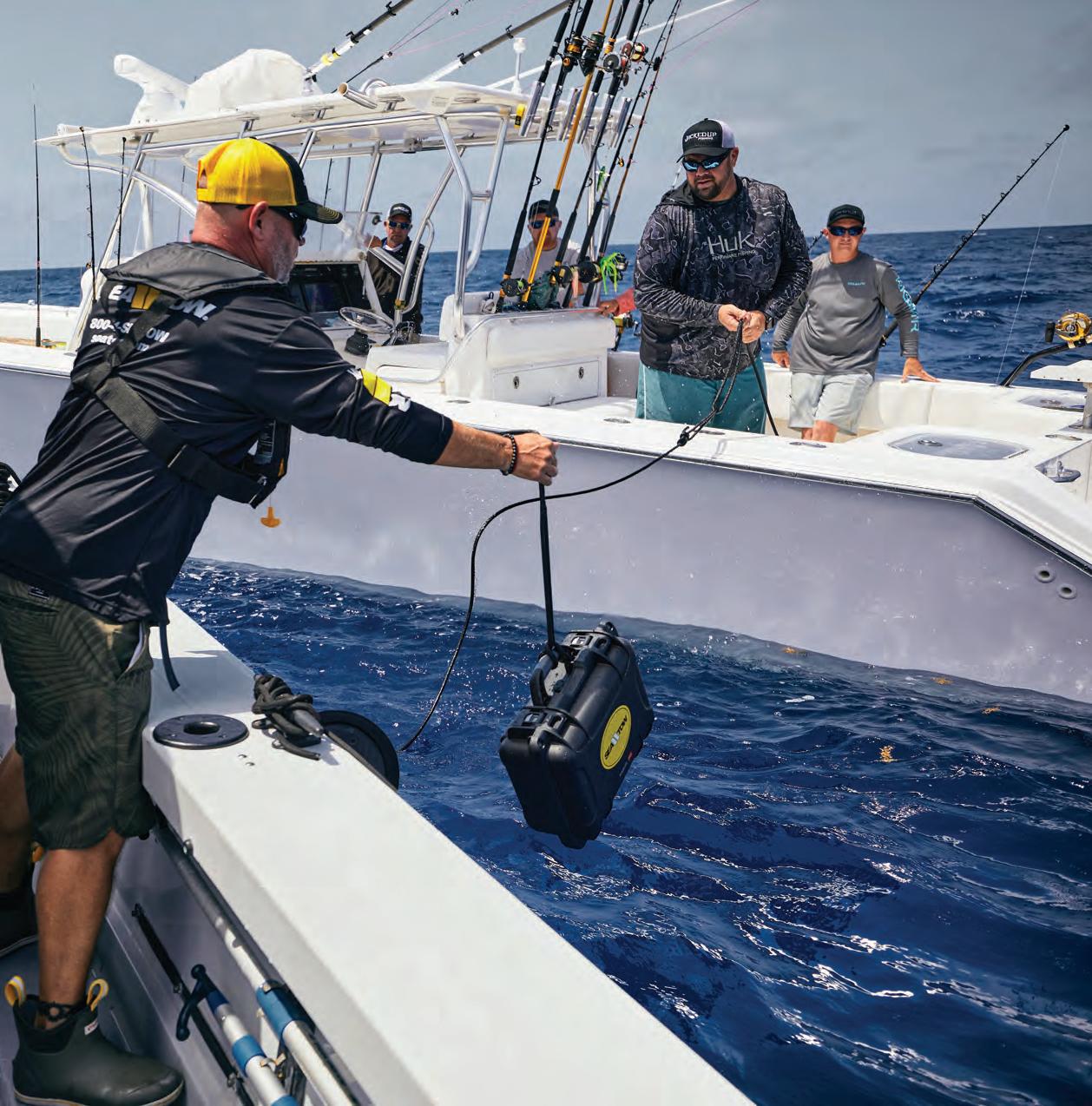


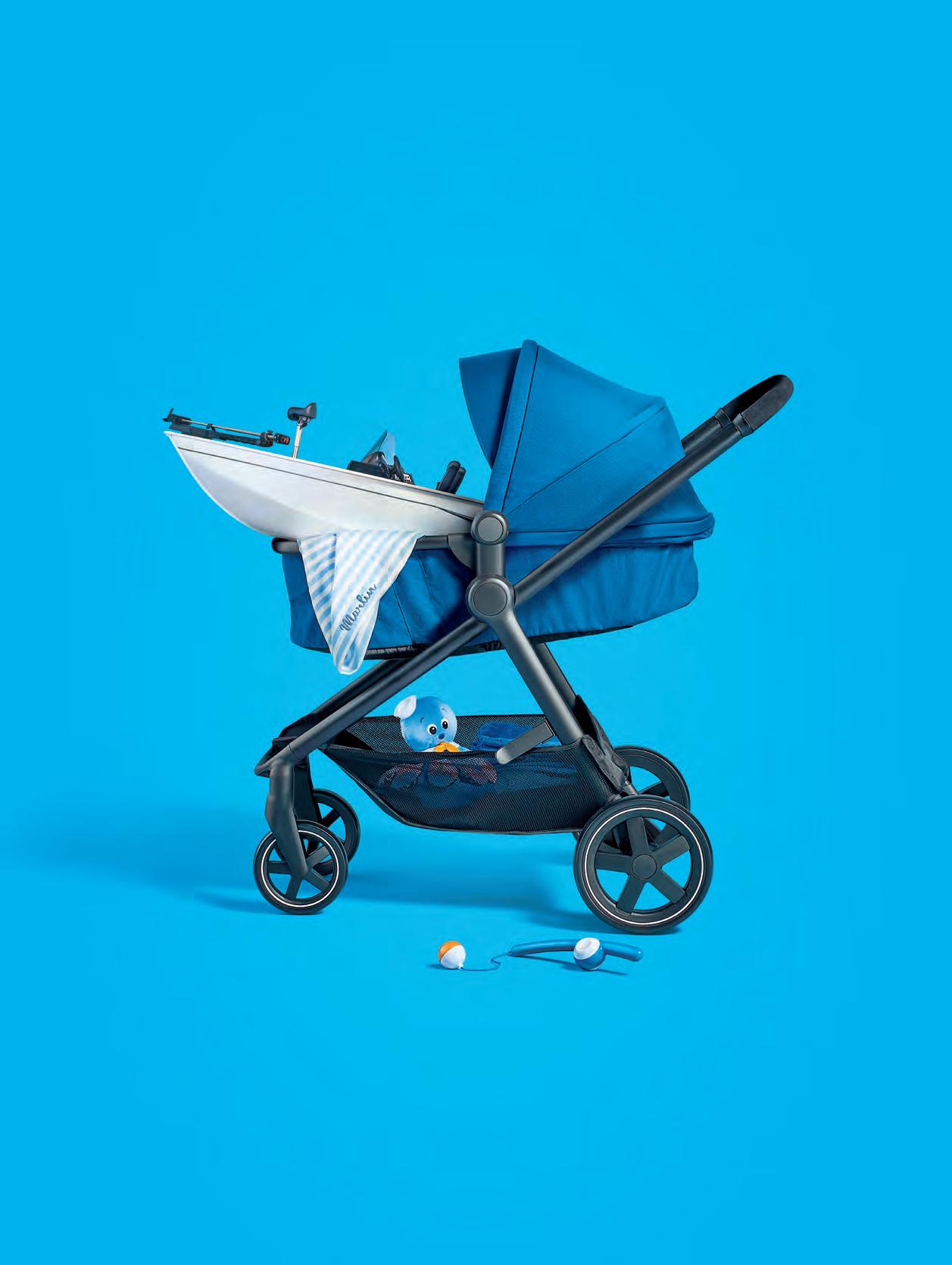
























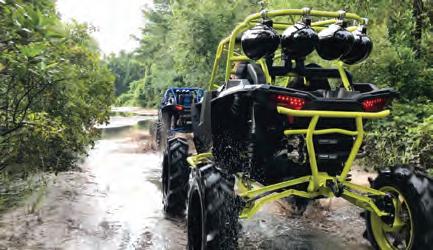


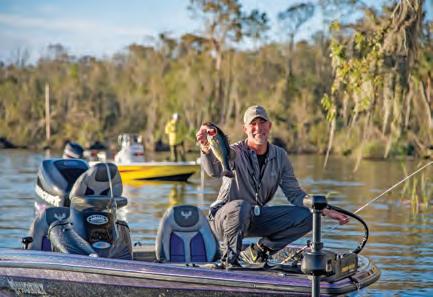
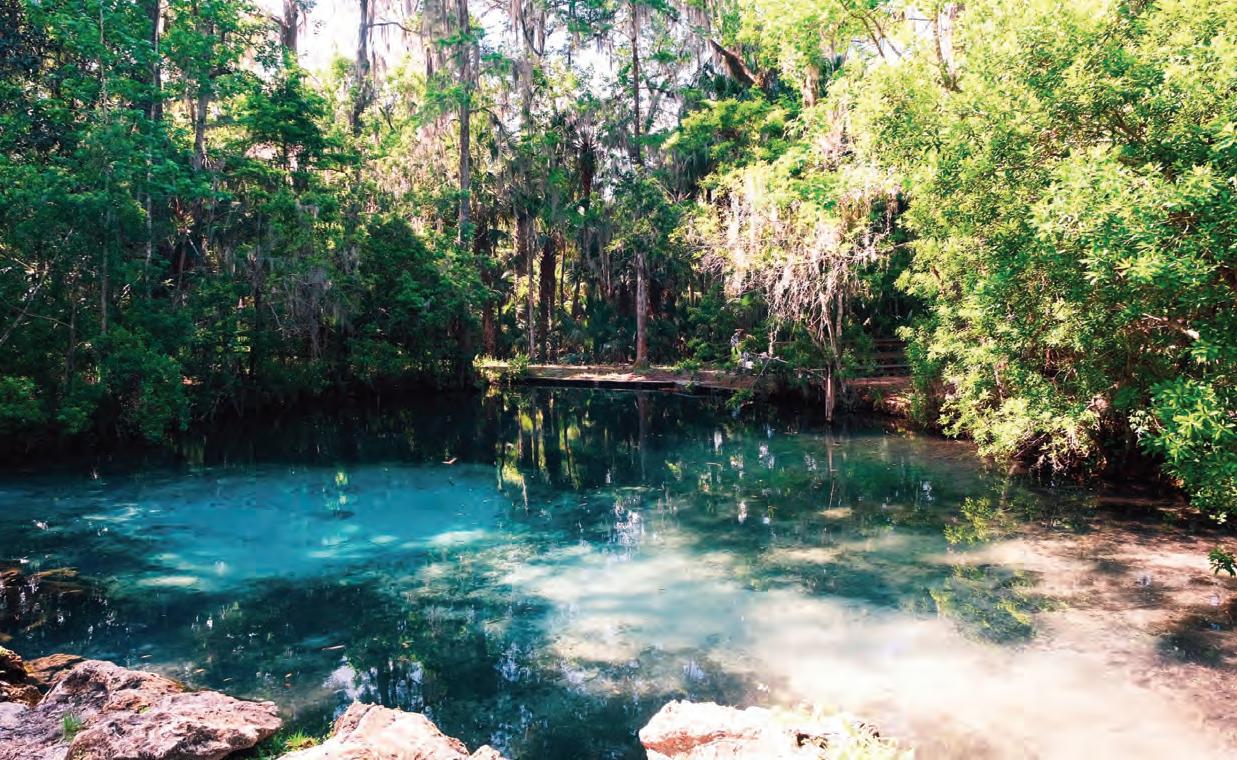


Located within two hours driving distance to all major attractions in central Florida, international airports and Florida’s beautiful beaches, Putnam County’s outdoor recreational choices are legendary. Between world class fishing, boating, hunting, cycling, hiking, golf, and more, Putnam County has it all. Whether you are seeking real Florida culture and heritage, recreation, or just relaxing in a small historic town, the residents and businesses of Putnam County invite you to Experience Real Florida


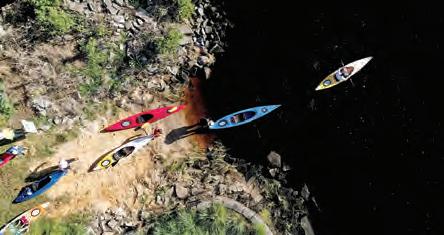
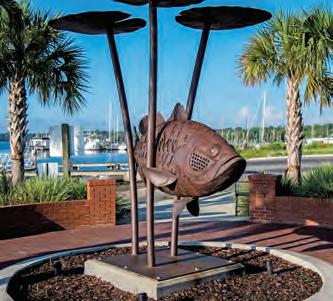



















Travel the globe, without leaving home—with this set of the world’s ve most popular pure silver coins. Newly struck for 2023 in one ounce of ne silver, each coin will arrive in Brilliant Uncirculated (BU) condition. Your excursion includes stops in the United States, Canada, South Africa, China and Great Britain.
Each of these coins is recognized for its breathtaking beauty, and for its stability even in unstable times, since each coin is backed by its government for weight, purity and legal-tender value.


2023 American Silver Eagle: The Silver Eagle is the most popular coin in the world, with its iconic Adolph Weinman Walking Liberty obverse backed by Emily Damstra's Eagle Landing reverse. Struck in 99.9% fine silver at the U.S. Mint.






2023 Canada Maple Leaf: A highly sought-after bullion coin since 1988, this 2023 issue includes the FIRST and likely only use of a transitional portrait, of the late Queen Elizabeth II. These are also expected to be the LAST Maple Leafs to bear Her Majesty's effigy. Struck in high-purity



99.99% fine silver at the Royal Canadian Mint.
2023 South African Krugerrand: The Krugerrand continues to be the best-known, most respected numismatic coin brand in the world. 2023 is the Silver Krugerrand's 6th year of issue. Struck in 99.9% fine silver at the South African Mint.





2023 China Silver Panda: 2023 is the 40th anniversary of the first silver Panda coin, issued in 1983. China Pandas are noted for their heart-warming one-year-only designs. Struck in 99.9% fine silver at the China Mint.

2023 British Silver Britannia: One of the Royal Mint's flagship coins, this 2023 issue is the FIRST in the Silver Britannia series to carry the portrait of King Charles III, following the passing of Queen Elizabeth II. Struck in 99.9% fine silver.




These coins, with stunningly gorgeous finishes and detailed designs that speak to their country of origin, are sure to hold a treasured place in your collection. Plus, they provide you with a unique way to stock up on precious silver. Here’s a legacy you and your family will cherish. Act now!
You’ll save both time and money on this world coin set with FREE shipping and a BONUS presentation case, plus a new and informative Silver Passport!
2023 World Silver 5-Coin Set Regular Price $229 – $199 SAVE $30.00 (over 13%) + FREE SHIPPING




FREE SHIPPING: Standard domestic shipping. Not valid on previous purchases. For fastest service call today toll-free
1-888-201-7070

















Offer Code WRD290-05










Please mention this code when you call.




On the end of a line or wrapped up in a tortilla, dolphin sh are a worldwide fan favorite. Here are a few facts you might not have known about mahi-mahi:
• What’s in a Name? Mahi-mahi is the Hawaiian term for the sh historically called dolphin or dolphin sh in the mainland United States. In Polynesian “mahi” means “strong,” and “mahi-mahi” translates to very strong. Although most U.S. scientist still refer to the species as dolphin sh, the term mahi has become more
prevalent in recent years, perhaps through foodsh marketing or to avoid confusion with the mammal also called dolphin.
Spanish speakers typically refer to the same sh as “dorado,” which means “golden.” Obviously, this comes from the sh’s color, and dorado is also used widely in the Paci c as well as in English-speaking South Africa.
Dolphin sh are found in all the world’s tropical and subtropical oceans. ey go by many names in many languages. ey are Shiira in Japanese, goldmakrele in German, lambuka in Arabic… and the list goes on.
• All the Pretty Colors: Dolphin sh are revered for their gorgeous colors, which change according to their excitement level. ey can change colors and even icker from day-glow green and yellow with blue highlights to lighter blue and metallic silver over the course of a ght. As soon as you pull them out of the water, this brilliance begins to fade. ese changing colors are due to cells called chromatophores in their skin. Chromatophores re ect light, contain pigment, and are controlled by central nervous system, which gives mahi their awesome chameleon-like abilities.
• Rabbit of the Sea: Part of the allure of mahi for anglers is their prevalence. When they are around, there are usually a lot of them around. ey grow quickly and reproduce proli cally, like rabbits. Dolphin sh can grow up to 3 inches in a week and reach sexual maturity in just ve or six months. ey spawn two or three times a year, and each female can release up to a million eggs during each cycle.
• Size Matters: While smaller “peanut” mahi travel and feed in giant schools, larger individuals cruise in smaller packs of two to ve sh. e average dolphin only lives two or three years, and they have a lifespan of ve to seven years. e IGFA all-tackle world record weighed 87 pounds and was caught o Costa Rice in 1976.
• Speed: Dolphin sh are estimated to swim up to 50 nautical mph, which allows them to feed on pretty much anything they can t in their mouths. is includes their little brothers and sisters.
• Management: It’s usually bad news for anglers when the federal acronyms pay special attention to a species. However, years of declining catches have led Florida shermen to call for tighter regulations for dolphin sh in the Atlantic. Currently, NOAA and SAFMC are looking at options.
Florida boasts some of the best dolphin shing in the world. e sharp multi-year decline in the shery is alarming. Last year, while SAFMC mulled potential regulations changes in federal waters, Florida preemptively slashed limits in state waters by half—from 10 sh to ve sh per person, with the vessel limit dropping from 60 to 30 sh per day.
SAFMC did not follow suit. With opposition to tighter regulations from North Carolina, where dolphin shing appears to be getting better, the per-person bag limit in federal waters of the South Atlantic remained at 10 sh per person, while the daily vessel limit was modi ed from 60 sh to 54 sh. ere is a minimum size limit of 20 inches in federal waters o South Carolina, Georgia and Florida. ere is no minimum size limit o North Carolina.
Many Florida anglers were stunned by the decision to pretty much allow federal regulations to remain as they were. Changes, however, are likely on the way. NOAA/SAFMC have initiated a “management strategy evaluation” with a stated goal of annually determining dolphin sh supply before allocating harvest equally to di erent regions and user groups. We might get a look at what that means by 2024.

• Grocery Shopping: Most of the mahi-mahi you nd in restaurants or at the grocery store comes from the Paci c. In the South Atlantic, just seven percent of the total catch limit is allocated to commercial shing.



A“double tackle” is what I call rigging two lures on the same main line. In certain situations, this appearance of a school of eeing bait sh or shrimp is irresistible to predators, and I’ve got a clean and simple way to rig a double tackle.

is the time of year, a double tackle can be deadly in inshore sheries. Spring brings huge schools of small, immature bait rolling up the creeks o the Intracoastal. ey push into the shallow bays and up the rivers trying to nd a place to hide from all the predators. Rigging two identical baits together can be irresistible to predator sh, and at the same it confuses them. I think sh look at this tackle, with baits zigging and zagging, and are forced to decide which one to eat, rather than whether or not to eat.
ere is always the possibility of catching two tackle. It happens a lot.
Speckled trout, striped bass and American shad are a few likely candidates for this tackle. Spring trout sometimes key on juvenile shrimp, and this tackle is a dead-ringer for the job. American and hickory shad are complete idiots for this tackle, as they stage in tight schools and you o en catch doubles. For the speckled trout, I like a 3-inch DOA Shrimp. For shad, I prefer small so -plastic worms.

Depending on water clarity, I sh 20- to 30-pound uoro for trout and 8- to 12-pound uoro for shad. is a very ne line between using a uoro light enough to get the bite and heavy enough to withstand the force of two sh yanking against each other on the line. e knot that connects everything together is pretty simple, but it takes a little practice to get it just right. It is a must to moisten the uoro when cinching the knot
down tight, as it will cut itself if it’s not wet. Test your knots, pulling hard on them, before use.
I’m going to get sporty this year and make a double-squid tackle for the black n tuna. I may get two at once, but that’s a gamble I’m willing to take. Stay in touch to my YouTube channel for video featuring the black ns. I think the black n tackle will be made with 50-pound uoro.





Regardless of the lure, I use jig heads that make baits walk the dog underwater like a Gotsh the front lure with a jig head, and it zigs and zags with the same cadence of the trailing lure, which has no jig head, just a hook. O en the trailing bait gets the bite.

I’m not going into a lengthy explanation in writing about how to make this tackle, but will show an up-close detailed video that explains this simple knot and rigging completely.
To see video instructions on rigging Tim Barefoot’s double tackle, go to https://youtu.be/FsdUGwyM9c4. For more, visit barefootcatsandtackle.com.


If you looked out your window a thousand years ago and saw a fleet of Viking longships coming your way,you knew you were in trouble. For roughly two centuries, the Vikings voyaged, raided and pillaged wherever they pleased. As expert sailors and navigators, they reached as far from Scandinavia as Iran, Constantinople, North Africa and the New World in their quest to expand their kingdom.
A mini sword. Too organized and too aggressive, no one stood in a Viking’s way. That’s exactly the message that our Viking Blade sends. Crafted from Damascus steel with brass inlay, this 12" full-tang knife is essentially a mini sword. Paired with its hand-tooled leather sheath, this knife belongs in the collection of any avid aficionado.



The steel of legend. For centuries, a Damascus steel blade was instantly recognizable and commanded respect. Renowned for its sharp edge, beauty and resistance to shattering, Damascus steel was the stuff of legend. While the original process has been lost to the ages, modern bladesmiths have been able to re-create Damascus steel to create the best blades imaginable.
Sure to impress, naturally. Combining natural strength and natural wonder at a price that’s hard to beat, the Viking Blade is a study in Damascus steel that’s sure to impress. And should you ever find yourself facing a Viking horde, a flash of this knife will show that you’re not to be messed with.





Don’t delay: Order within the next week and we’ll offer this blade to you for just $99, a savings of $200! That’s the best bang for your buck we can possibly offer: our Stauer® Impossible Price. Get your hands on one of the fastest-selling knives in our company’s history today.
Knife Specifications:
• 12" overall length. 7" Damascus full-tang blade

• Includes genuine leather sheath
Viking Blade $299 $99* + S&P Save $200

California residents please call 1-800-333-2045 regarding Proposition 65 regulations before purchasing this product. *Special price only for customers using the offer code.

“This knife is everything promised. Beautiful beyond comparison. And completely functional. Love it.”
— Gene, Auburn, WA

It’s the time of year when crappie shing can get mighty easy. However, you can always strive to load the cooler with more and bigger sh. Here are a few tips:
• Know Your Prey: Crappie are on the move this time of year. ey might be staged up at prespawn or postspawn depths, or they might be right up on the banks in a foot and a half of water spawning. Knowing their cycles will help you nd them.


Before and a er they spawn, crappie hold on brush and structure just outside of their spawning areas. ey move up into the shallows to spawn in waves, and this can go on for a month or more. So, while some sh are easy targets when they’re spawning or guarding fry on super-shallow brush, there are other, possibly larger, sh feeding a little deeper.
If you’re not catching the numbers or size you’d like to see in the shallows, get on the trolling motor and use your sonar to nd the creek channels and rst drops o the spawning areas. Find some good brush or search the fronts of docks. You might nd big schools slab crappie. Pitch jigs or minnows to individual brushpiles or slow troll these deeper areas to nd sh.

• Ditch the Bobber: A minnow under a bobber is a traditional and e ective crappie rig. It is not, however the most e cient way to catch them in most situations. During the spawn, male crappie are the ones that stay shallow and guard the nests. ey are aggressive, and they are not necessarily feeding when they attack. ese sh are particularly susceptible to gaudy, brightly colored jigs.
Crappie jigs are the best way to cover water both on
spawning banks and on deeper brush. Even when they’re feeding heavily, crappie on brush won’t chase their prey more than a few feet. A jig allows you to make numerous casts and thoroughly cover the water horizontally and vertically in the time it would take to hook and soak a single minnow under a bobber.
Move quickly until you nd the you can slow down and catch them all. If you still want to support the local live bait store, go ahead and buy some minnows and thread them through the lips on a crappie jig.
• Scent: You might not need it all the time to catch sh, but scent helps crappie nd your lure and convinces them to eat. It doesn’t hurt to tip your jig with a minnow, and arti cial attractants like PowerBait Crappie Nibbles or JJ’s Magic can sometimes make them bite when they’ve got lockjaw.
• Network: Make friends with other crappie anglers. ere’s no shortage of available crappie in most lakes. Sharing information with other anglers helps everyone stay on top of the sh. You don’t have to tell anyone where you sunk your Christmas tree in January, but a little give and take doesn’t hurt when you’re talking about stages of the spawn or e ective colors.
For more crappie shing, visit www.coastalanglermag.com.
Bulletin
58 YEARS OF REPOWER EXPERIENCE!
Mastry Engine Center has received the Suzuki Marine Super Service Award and has been ranked #1 in Suzuki Marine US Sales!

Repower packages designed to best fit your needs and not stretch your budget. Financing available.






All Suzuki repowers come with the new Suzuki 5-year factory warranty.
Suzuki RePower Centers are stationed around the southeast to help with your Suzuki service and repower needs.
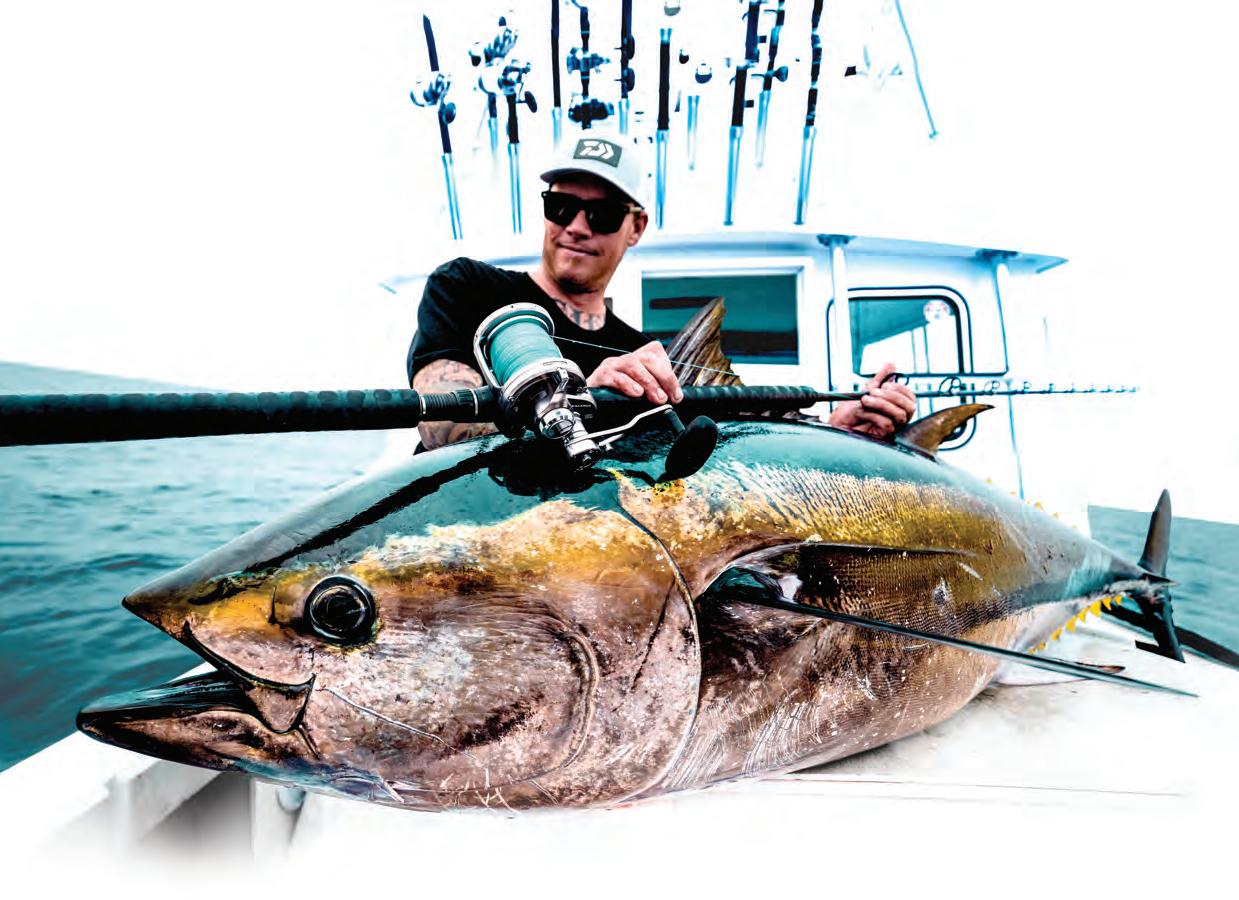
Up your game like never before with the biggest and brightest TZtouchXL MFDs.


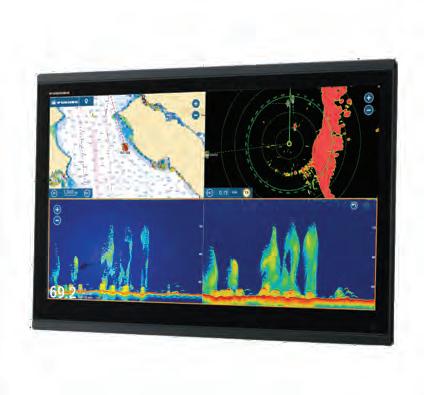
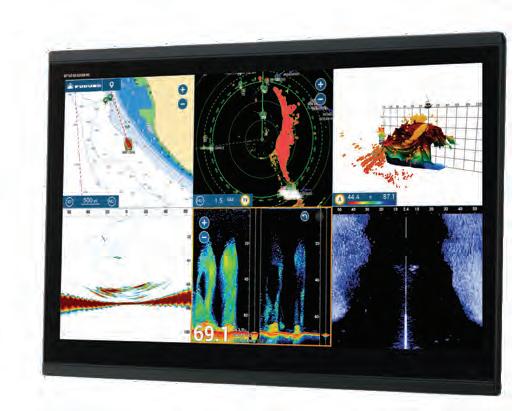



 By Emily Rose Hanzlik
By Emily Rose Hanzlik
With spring nally here, the ocean is open to many possibilities here in South Florida. One of my favorites is the arrival of larger blue sh, which tend to migrate this direction at this time of year.
Blue sh are a popular game sh in almost all the waters surrounding the United States. Smaller blue sh from 7 to 9 inches are sometimes called snapper. ese sh have extremely sharp teeth, with prominent canines on both the top and bottom jaw.
Blue sh are common along the Atlantic coast of the United States, and



range from Cape Cod down through Argentina. eir migrations are a tricky subject. Most people believe blue sh travel from Florida up to New Jersey, and then back down to Florida. However, this has never truly been proven. While doing some research, I found a few studies that never came to a clear conclusion.
What we do know is that blue sh spawn at the edge of the Gulf Stream o Florida in spring. e timing varies from year to year, but there is usually a three to seven-day window when larger blue sh swim closer to shore. For Florida, this is the time when we catch our largest blue sh, and this week is normally sometime in April.

Most smaller “snapper” blue sh tend to hang around mangroves, estuaries and bridges to ensure their safety. is provides them with cover from predators and access to smaller prey also hiding in these “safe” areas. Once they get large enough, they move o the coast to feed on larger, more abundant prey. ey are typically found in inlets, around piers and o the beaches, where large bait schools ensure a better hunt with less energy being exerted.
When hunting for blue sh, you’ll want to start where the bait is. Most of the time you will see blue sh schools popping bait schools on the surface, and other blue sh will be cleaning up the mess below. For this situation, you can use any kind of spoon, X-Raps or jigs. Normally, you’ll want to use a small piece of wire so that they don’t cut you o

If you don’t see blue sh popping baits, you can look for oil slicks. Some experts say they can smell the odor from their oils. But, for those who can’t “sni out” the sh, you can throw chunks of dead le over bait and let it stink up the water to draw them in. Usually a 2-inch chunk of mackerel, jack or even dead bait sh like sardines will attract any blue sh in the area.


Currently, on the east coast of Florida, you can keep three blue sh per person, per day. Many people prefer to use blue sh as bait, while some will make a stew or cook them whole. e IGFA all-tackle world record blue sh was a 31-pound, 12-ounce monster caught out of Hatteras, North Carolina.
Emily Rose Hanzlik holds 56 IGFA world records in various categories. She hails from West Palm Beach, where she has a part time Bow n Guide Service as well as shing classes for Jr. Anglers. Find her on social media @emilyhanzlikoutdoors.

















Suzuki RePower – It Simply Makes Sense
RePower – It Simply Makes Sense





Why are More Professional Mariners Choosing Mastry
Suzuki RePower - Power, Reliable, Durable & Best Value
Suzuki RePower - Power, Reliable, Durable & Best Value




When Considering A Repower, Consider These Factors:
When Considering A Repower, Consider These Factors:
• Mastry Suzuki RePower Centers have decades of repower experience providing proper rigging, controls, propeller matching and in water testing
• Mastry Suzuki RePower Centers have decades of repower experience providing proper rigging, controls, propeller matching and in water testing


• With a Mastry Suzuki RePower, owners gain improved performance, less noise and greater reliability
• With a Mastry Suzuki RePower, owners gain improved performance, less noise and greater reliability







• Options that will fit most any budget, financing available
• Options that will fit most any budget, financing available


• Mastry Suzuki RePower’s exclusive Owner’s Edge Program*
• Mastry Suzuki RePower’s exclusive Owner’s Edge Program*
• All Suzuki RePowers come with Suzuki’s 5-years of protection
• All Suzuki RePowers come with Suzuki’s 5-years of protection
With 13 Locations Across Florida There is a Mastry Suzuki RePower Center Near You
With 13 Locations Across Florida There is a Mastry Suzuki RePower Center Near You






*Get with the Program!
*Get with the Program!
When you purchase a new Suzuki outboard from an authorized Mastry RePower Center you qualify to become a member of the Mastry Suzuki Owner’s Edge. Owners receive an identification card that provides them with important information about their Suzuki outboard motor as well as a passport to additional benefits during ownership. Members enjoy a detailed engine maintenance schedule, Mastry Suzuki RePower Trade Program and special pricing from Mastry Suzuki Partners.
When you purchase a new Suzuki outboard from an authorized Mastry RePower Center you qualify to become a member of the Mastry Suzuki Owner’s Edge. Owners receive an identification card that provides them with important information about their Suzuki outboard motor as well as a passport to additional benefits during ownership. Members enjoy a detailed engine maintenance schedule, Mastry Suzuki RePower Trade Program and special pricing from Mastry Suzuki Partners.

suzukirepower.com | 1-800-545-4574
suzukirepower.com | 1-800-545-4574


At its late February commission meeting, FWC approved regulations changes to cut possession limits for three species and establish new open seasons for two of them in Florida’s Atlantic state waters. e modi cations are consistent with current and pending regulations for federal waters of the Atlantic.
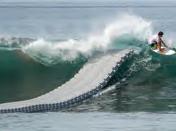
• e bag limit for red porgy will be cut from three to one sh per person, per day. An open season of May-June will be established.
• e snowy grouper bag limit will be one sh per vessel, per day. is is a decrease from one sh per person, per day. An open season of May–June will be established.
• e blueline tile sh bag limit will be reduced from three sh to two sh per person, per day, and for-hire captain and crew will be prohibited from retaining a bag limit.
Last year, the South Atlantic Fishery Management Council approved management changes to help rebuild the red porgy and snowy grouper stocks, which are over shed and undergoing over shing, and to reduce the risk of over shing for blueline tile sh.

e red porgy recreational limits will be e ective April 1 in Atlantic state waters, and the snowy grouper and blueline tile sh regulations will go into e ect at a later date once pending federal regulations have been implemented.
For more information, visit MyFWC.com.
Lasting 2-3 times longer than wooden, concrete, and aluminum docks, our modular foating system is the preferred dock choice for residential, commercial, marina, liesure, and other applications. Customizable and confgurable for boat docks, liesure and recreation docks, and drive-on jet ski and personal watercraft!
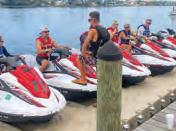
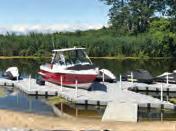

•High-quality plastic
•Environmentally-friendly
•Guaranteed for 20 years
•Near-zero maintenance
•Completely customizable
•UV and pollution resistant

Anglers pursuing reef sh in Florida state waters will now be required to have a descending device or venting tool onboard that is ready for use. ey will also be required to use the device or tool on sh exhibiting signs of barotrauma prior to release. is new rule was scheduled to become e ective April 1 a er being approved by the Florida Fish and Wildlife Conservation Commission at its February meeting.
Release mortality is a top sheries management challenge. As reef sh are reeled up from depth, they can su er a pressure-related injury known as barotrauma. If not treated correctly, barotrauma can be lethal to sh Descending devices or venting tools can help sh recover from the e ects of barotrauma.
Barotrauma mitigation tool requirements have already been adopted in Gulf and Atlantic federal waters. In Gulf federal waters, shers have the choice of possessing either a descending device or a venting tool that is rigged and ready for use. In Atlantic federal waters, shers are required to have a descending device that is readily available for use. is new rule for Gulf and Atlantic state waters allows anglers to choose which type of tool
best ts their circumstances.
A summary of the proposed rule presented at the meeting also indicated a concern about private anglers either not being aware of the requirements or not having con dence with the use of such devices. FWC has committed to an outreach program designed to raise awareness on the proper use of barotrauma mitigation tools.

Find current reef sh gear requirements at MyFWC.com/ReefFishGear. Anyone who plans to harvest or attempt to harvest, including catch and release, certain reef sh species in Gulf or Atlantic waters from a private recreational vessel must sign up for the free State Reef Fish Angler designation and renew it annually. Learn more at MyFWC.com/SRFS and sign up today at GoOutdoorsFlorida.com.
For more information, go to MyFWC.com.











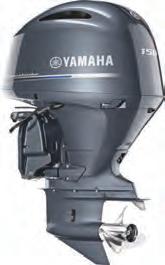


























The International Game Fish Association (IGFA) tracks record sh catches around the globe. eir world record database is a great source to see some of the sh anglers are catching around the world. Here are a handful of catches recently approved for the record books. To see all newly approved IGFA records, visit igfa.org.

On Aug. 12, 2022, Ng Yam Pin landed this beautiful 28-pound giant snakehead in Rawang, Malaysia to set IGFA’s mens 20-pound line class world record. Pin caught the big snakehead on a Duo Fangbait lure and released the sh a er recording the weight and proper measurements. e IGFA all-tackle world record for giant snakehead was also caught from Rawang. It weighed 30 pounds. Bluch’s

On Nov. 5, 2022, Aussie angler Frank Bluch was shing the Tekapo Canal, New Zealand, with guide Nicor Sutherland, when he landed this impressive 21-pound, 13-ounce rainbow trout. It set the new IGFA men’s 2-pound tippet class world record. e sh ate a y Frank calls the “Orange Monstrosity.” e all-tackle world record rainbow was caught from Lake Diefenbaker, Canada. It weighed 48 pounds.

Joachim Ochmann caught this huge 140-pound, 10-ounce wels from Rio Ebro, Spain on Oct. 1, 2022. It took him nearly two hours to land the new IGFA men’s 16-pound line class world record. He released it a er taking proper weight and measurements. e all-tackle world record wels was caught from River Po, Italy in 2010. It weighed 297 pounds, 9 ounces.

Fumiya Okuyama holds several IGFA world records for grass carp, and he recently set another with this 109-centimeter (nearly 43-inch) sh he caught on Oct. 20, 2022, to establish the new IGFA all-tackle length y world record. e all-tackle world record by weight was caught at Piasuchnik Dam, Bulgaria in 2009. It weighed 87 pounds, 10 ounces.


There’s a movement across the state right now that many of you need to know about it, if you don’t already. You’re going to see these petition gatherers at your local fairs, art shows, beer festivals and fishing tournaments.
It’s called the Florida Right to Clean Water. And it could be what’s needed to finally clean up our waterways once and for all.
Now let me first say, I’m not a big petition signer. Normally, I shy away from these efforts to amend the state constitution for some obtuse purpose.
But this is different. After decades of trying to get our state
agencies to enforce laws on the books to protect and clean our lakes, rivers, lagoons, bays and beaches, a group of citizens had enough.
The heavy lifting, though, is up to us. You see, lawmakers made it hard for Florida’s citizens to demand clean water. In this present legislative session, they even are pushing a bill to prevent counties and communities from protecting wetlands and coastlines from developers.

This may be our last hope.
By November of this year, the Florida Right to Clean Water grass roots movement needs 900,000 signatures from registered Florida voters just to get on the 2024 ballot. If it does make it the ballot, I’m confident 72% of the voters will



pass it. Floridians have on similar measures in past years.
But getting it to the ballot is the hard part.
If you are a fisherman or fisherwoman, boaters, or you just like taking the family to the sandbar on Sunday, you need to sign this petition.
Don’t take my word for it: Go to
FloridaRighttoCleanWater.org to learn about the issue yourself or to download, print and mail a petition back to Fort Myers.
The water we save we can enjoy for generations. But if we don’t step up now, we may lose it all.

Sign the petition and learn more at FloridaRightToCleanWater.org.

“The proposed Right to Clean Water state constitutional amendment may be the last meaningful opportunity to turn the tide on Florida’s rapidly declining waters.”
~ Calusa Waterkeeper Emeritus, John Cassani
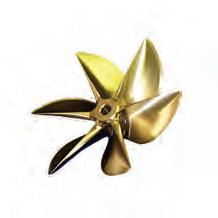
Sea Tow is happy to extend it’s service to include tows from Nothern
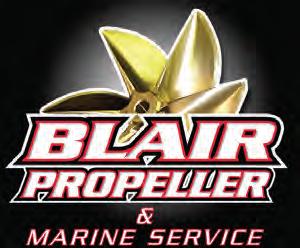


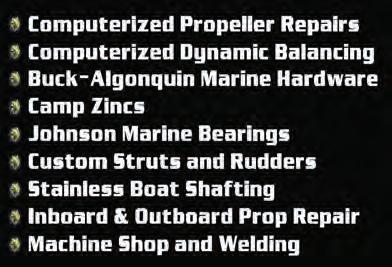

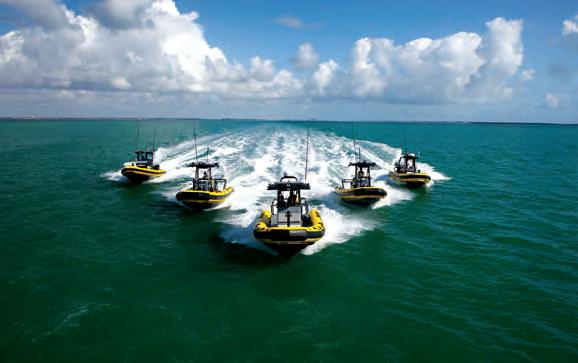

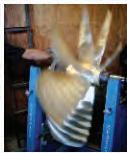
It’sspring and that means it’s peak mating season for horseshoe crabs. Help biologists with the Florida Fish and Wildlife Conservation Commission (FWC) gather valuable information about these ancient creatures by reporting sightings via their online survey.
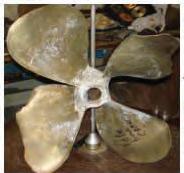
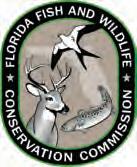

Horseshoe crabs mate by pairing up with a smaller male attached to a larger female. They then crawl onto the beach up to the high tide line, the female digs a nest and lays her eggs, all while the male is attached and fertilizing the freshly laid eggs. They mate yearround but it is most common to see mating groups along the shore of sandy lower-wave action beaches in March and April as well as September and October. Beachgoers will have the best luck spotting horseshoe crabs around high tide, within a few days of a new or full moon.
Reporting horseshoe crab sightings provides valuable information to the FWC about habitat use, population distribution and environmental conditions for nesting. Although horseshoe crabs have existed for more than 450 million years, scientists are still learning about Florida populations. Public sighting information helps FWC researchers target nesting beaches for the Florida Horseshoe Crab Watch Program, a citizen-science based initiative to collect data throughout the state.
If you see a horseshoe crab on its back, you can help it flip back over by gently picking it up (holding both sides of the shell), turning it over and releasing it back into the water. Simple actions like this help conserve this species and the many other species that depend on it.
The FWC asks the public to report sightings by visiting MyFWC.com/ research, clicking on “Crustaceans,” then “Horseshoe Crabs” and selecting “Report Your Nesting Horseshoe Crab Sighting” to complete the survey.


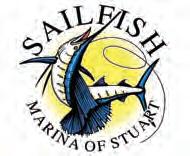


Join the Florida Fish and Wildlife Conservation Commission (FWC) for Florida WildQuest 2023. Florida residents and visitors are encouraged to grab their phones and go on a wild adventure to complete scavenger hunt missions and discover some of Florida’s best spots to see wildlife and enjoy the outdoors. This year’s event will take place on Florida’s Wildlife Management Areas across the state April 28–May 7. Qualifying players will be entered in a random drawing to win wilderness-inspired prizes. Follow these steps to adventure:
1. Find It: Find your closest WildQuest WMA by visiting the Entrance Finder tool at https:// ocean.floridamarine.org/wma/ entrances/ and looking for the areas marked by green dots.
2. Charge Up: Make sure your phone is charged and the Goosechase app is installed (available at: https:// www.goosechase.com/download). Not all areas have mobile coverage but you’ll be able to take pictures for your scavenger hunt missions and submit them later. Visit FloridaWildQuest.
com for instructions on how to join a WildQuest.
3. Be Safe: Stay on marked roads and trails. Before you enter a trail, be sure it fits your skill level and a distance you’re prepared for.
4. Pack Smart: It gets hot outside and there are no vending machines in the wilderness. Check the weather before you go. Pack water, sunscreen and snacks!

5. Snap a Pic: Most WMAs have a kiosk at the main entrance with a welcome sign that includes a map and important reminders for visiting the area. When you see this sign, be sure to take a picture for reference. Grab a guide at the kiosk if one is available.


WildQuest players of all ages will have opportunities to learn about and explore Florida’s extensive WMA system during the event. Registered players can also qualify for a chance to win wilderness-inspired prizes by earning at least 2,000 points on one of the scavenger hunts (don’t worry, it’s easy!).
Florida has one of the nation’s
largest systems of state-managed wildlife lands. The WMA system includes more than 6 million acres managed primarily for wildlife conservation and nature-based public use. The areas featured in WildQuest will engage players in learning about Florida’s wildlife, habitats and recreation opportunities. The FWC maintains, enhances and restores native natural habitats for the benefit of plant and animal populations as well as for the people of Florida
Marina.
Capt. Scott Fawcett
Off the Chain Fishing Charters
(772) 285-1055
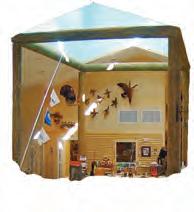
offthechainfishing.com
fishscottyf@bellsouth.net
Sails, mahi, blackfin, king fish, and wahoo, all the obvious signs that spring is here and it’s time to go fishing.


As the winds turn south and start to subside a bit, the water starts to warm and seasons change. April offers some of the best fishing of the year in my opinion, and this season, in addition to the fish making their way back to north and staging off our coast as they do every year, we have a massive sargassum weed bed making its way towards us from the east. While this may make fishing difficult at times, it should benefit us on the whole. Almaco jacks, ocean tally, and lots of bait mixed in and hiding along it creates the perfect habitat and FAD for dolphin, wahoo, blackfin tuna and a sails. Look for this and less obvious
edges and color changes inshore of it along our six- and eight-mile reefs as places to target your quarry.

This time of year, I use light 12-to-20-pound circle hook rods made by local rod manufacturer Blackfin Rods. Fin-Nor Marquesa reels spooled with 15-pound line, light leaders and small hooks are the perfect match for our everyday fish in the spring and will let you enjoy the fight rather than skipping fish the across the water.
Whether you’re trolling or live baiting, loose drags and smooth feeds are the key to success. Ballyhoo rigged with circle hooks, a planner rod with wire leader and a squid chain and or a dredge as teasers will work well while trolling dead baits. Thread fin, goggle eyes and pilchards work wonders as live bait this time of year and on days with a little bit of a breeze
I highly recommend Tigress kites. Fish them effectively and with ease using Diawa Tanacom reels, Tigress Tridents and a Fish Razr dredge deployed from a Cannon downrigger while fishing along our reef lines, edges and artificial bottom. Add spit shots to the outside edge of the kites to steer them away from each other to maximize your footprint and present baits in more effective way. On days

Chaos Fishing Charters
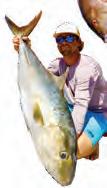
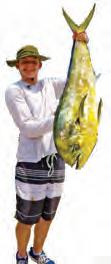


(772) 341 – 2274
www.chaosfishigcharters.com
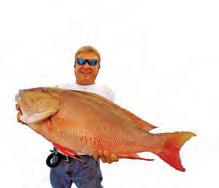

jon@chaosfishigncharters.com
Thisis a great month to target snook on the Treasure Coast. Bait fishing with pilchards will yield the most bites from snook of all sizes. Early mornings around select structures can produce epic strikes when fishing topwater lures before or just after first light. Night fishing around bridges will produce larger snook. Larger live baits and flairhawks or large swimbaits will get the bites after dark.
Capt. Rocky Carbia
Safari I Deep Sea Fishing
Pirates Cove Resort and Marina
4307 SE Bayview St. Port Salerno
Reservations: (772) 334-4411
Safari-1.com
Florida’s April sunshine will illuminate a near coastal ocean that will play host to some of the most prized saltwater grocery trophies in the world. Cobia, snapper, mahi, and king mackerel will top this briny hit list and will be found around and atop the renowned reef system, east of our St. Lucie Inlet. The offshore fish hunters of April will delight in engaging in strategies that involve both surface and bottom fishing during open, user-friendly, weather windows this month. April can still be a windy month that produces rough sea conditions, so anglers (as always) will need to continue to monitor daily offshore forecasts.
Cobia typically make a strong showing during the golden days of April and will be found in many



Oversized jack crevalle’s dominate the river and beaches this time of year. Larger spinning reels with heavy leaders will help you stop these freight trains. Jacks love a large mullet around any structure. Now if you’re looking for smaller edible bottom fish, fishing with shrimp will produce grey snapper, black drum, flounder, and the occasional redfish. Remember redfish are still catch and release only at this time.
Tarpon fishing around channel edges with larger mullets can be very rewarding if you’re willing to soak a bait long enough to get the bite. Heavy leaders and large circle hooks will give you the upper hand if you want to see these giants boatside.
Nearshore fishing has been pretty good for tarpon, snook, jacks, permit, kingfish, sharks, and goliath grouper.
Kingfish are plentiful around bait schools off the beaches this time of year. Fish live baits throat hooked on a 7/0 triple hook rig. This is an easy way to catch a few for the smoker without the hassle of having to tie a wire leader on.
Live crabs will get the bites from schools of permit cruising the beaches this month. Lead the school of permit with a live crab on a circle hook and or weighted jig head depending on the depth of the traveling permit school. This technique will also work well for traveling schools of tarpon cruising along the beach as well. Also, I typically use large topwaters or swimbaits this month for giant jacks cruising along the beaches. Cast a plug out in front of these large schools of jacks, reel the topwater back quickly, and hold on!!
Tight lines!
MC OFFSHORE ................. FROM PAGE 4
when there is not enough wind, fish your outriggers while still trying to incorporate a teaser.
If you rather throw the long ball, this is a great time of year to try for yellowfin tuna. Using your radar to find packs of birds, and pulling medium to large ballyhoo on the edges and outskirts of this action is a
dynamic scenarios of the local, liquid playing field. Hungry packs of cobia will be attracted to all types of reef structures, both naturally occurring and artificial, and will fall to live and dead baits presented throughout the water column. Live baits are especially effective and will prove to be irresistible to a cobia in
great way to earn yourself a lifetime supply of sashimi. If tuna isn’t your thing, maybe swordfish? Or even snapper along the reef?
April offers all the options with great chance of success in each so enjoy the hunt. Whatever style of fishing you decide to do this spring, I wish you the very best of luck, and I hope your next fishing trip is Off The Chain.
the right mood. Besides being found around bottom structures, ‘cobes’ tend to follow and swim along with larger sea animals, like manta rays
and southern stingrays, turtles, and sharks.
Casting to a cobia towing behind a larger sea creature is best achieved using three- to four-ounce jigs, tipped with a long ribbon of squid. Bottom fishing for the many species of the snapper family will continue to be a go to strategy for Treasure Coast meat hunters in April. Large mutton and mangrove snapper will be available in good numbers along the reef line in 70 to 90 feet of water and allow fishermen to test their angling finesse while attempting to capture these fish athletes of the ocean floor. Wrestling a large snapper to the surface can be a full contact and exhilarating moment, made more satisfying as the filets hit the frying pan.
With this in mind, pack the cooler with plenty of dead bait, catch some “live-ies” if you can, and have an assortment of jigs standing by. And don`t forget to pull out some coastal recipes to fully enjoy the salty grocery trophies of April.
Monday-Saturday 8:30AM-1:30PM
Adults $70; Children $60
Sunday 8:30AM-3:00PM
Adults $80; Children $70
Capt. Bo Samuel
Pullin Drag Charters
(772) 971-6661

facebook.com/Pullin-Drag-Charters

catainbofishing@gmail.com
Some say spring is in the air, but I say it’s in the water! Nothing beats our springtime fishing. April action around the Treasure Coast includes some highly prized trophy fish like cobia, snapper, mahi-mahi, sails, and king mackerel. This time of year, most of the windy days are behind us and we should see great weather, great water quality, and great bait fish.
Most anticipated is the migration of the larger mahi-mahi from down south. While we always have mahi off the Treasure Coast, this is the time the bigger ones start working their way north. As the cooler water temperatures begin to warm up, expect the mahi action to heat up, too. Mahi anglers know that April
is the time to target these amazing acrobatic fish known for their aerial jumps, brilliant Easter-like colors, and great taste. Get your trolling gear ready and head offshore. Look for weed lines, diving birds, floating debris, and color changes to begin your troll. If you have a couple of these, get ready for some serious action. Naked or skirted ballyhoo work great but be sure to keep free from weeds so they swim properly. Mahi are schooling fish so when you hook one, leave it beside the boat and look for more. Mahi must be 20 inches to the fork to harvest. It’s always a good idea to have a pitch rod ready to go for any cobia or tripletail that might be hanging around the weeds or debris. Adding one of these to your fish box increases bragging rights and photo opps.
Snook season has been phenomenal since opening in February with beautiful keepers caught drifting the Fort Pierce Inlet as well as significant underand-over slots. Best bait choices are live pilchards, pinfish, croakers, and select shrimp. Fishing around docks and other structures with fast moving current can provide notable snook action. Anglers of all ages enjoy the excitement of targeting
this smart trophy fish for their great fight and even greater taste. Remember, the slot limit is not less than 28 inches to not more than 32 inches and the season closes at the end of May.
It’s definitely time to take advantage of the calmer days of April and work on that salty grocery list.
Local fishing knowledge, years of experience, and the fishiest charter boat in the area as my “office” means you’ll be fishing AND catching. If you’re ready to celebrate the arrival of spring on the nicest waters of the Treasure Coast, then consider hopping on a charter with me for a salty time Pullin Drag!


St. Lucie Flats Fishing Charters


(609) 820-6257
www.stlucieflatsfishing.com
Spring has arrived! Aside from a few good cold fronts, this winter wasn’t too bad. Warm and windy days will be the norm throughout April. Water temps will start to rise and there will be lots of opportunities for several species this month. The spring transition is a great time to be on the water, so get out there and enjoy the fishing.
The snook fishing will be consistent all through this month. Whether you fish the inlet, bridges,

Capt. Scotty Gold
Miss Fort Pierce Fishing
(772) 766-0191
fortpiercefishing.com

Aswe come away from the unpredictable March winds, April is upon us.
We start to see more cobia and mahi make their spring appearance. You will find them on the offshore reefs in 70-to-100 feet. Have your spinning rod ready to pitch out a sardine bait right in front of the swimming fish and hold on!
We will continue to catch lane snapper, triggers and porgies.
This time of year, the mangroves and mutton snappers start to feed more frequently as it is closer to the spawning season. Fresh cut bait, sardines, thread fins, and finger mullet are all good choices.
Fish a 40-to-60-pound
or flats there will be plenty of opportunities to catch snook. The spoil island points will hold quite a few fish throughout the spring. Freelining pilchards, greenies, or croakers work very well to get those mid-to-late morning shallow fish to bite. If you would like more of a challenge, top water lures like a (Rapala) Skitter Walk or soft plastics like a (Reaction Innovations) Skinny Dipper are both great options for snook at first light.
On the calmer days, getting out on the beach is a great way to spend the morning. Big jacks, tarpon, kingfish, and the like, will be in the area through April. Slow trolling live baits around the edges of the greenie schools is great way to target kings. The sub-30-inch kings, if iced very well and bled, are pretty good table fare. Anything
larger goes on the smoker.
Keep your eyes peeled for the schools of big jacks while you’re out there. Kastmaster spoons or big popper work well for these bruisers when they’re up on the surface milling around. Using tackle, a bit heavier than you think you need is imperative. The sharks off our coast are relentless and you need the ability to really crank on the fish if one shows up.
Back inshore the bridges and channel edges will have some sheepshead, drum, jacks, and snapper. With the winter being a bit warmer than normal, the bulk of the sheepshead will have already moved out to the first reef. Summer is right around the corner. Get out and enjoy the last of the cooler temps we will have until next winter.
fluorocarbon leader 10-to-30 feet long with an appropriate sinker. Fish your rig in the “free spool” made and wait for the hard snapper bite, then start reeling. Set up on ledges and high points on the reef. Look to fish from 65 to 125 feet of water.
The weather will become more
dependable as the month goes on and we get closer to May 1, when grouper season re-opens.
The 65 foot Miss Fort Pierce sails daily on an all day schedule at 7 a.m.

Reservations required. To book, visit us at www.fortpiercefishing.com or call us at (772) 766-0191. We look forward to welcoming you aboard.

Capt. Gus Brugger
Pattern Setter Charters (772) 360-6787











www.WelcomeToSebastian.com
April means comfortable weather and a long list of species to target in the Sebastian area. It would be a shame to limit yourself to pursuing a specific type of fish when so many are available. Why not try to get an inshore grand slam: seatrout, redfish, snook and tarpon. Some days you can just stumble into a slam as you work backwater shorelines. Other days it can involve time, tide, tackle, weather and mobility to get to and catch each species. Being prepared and having a plan is the key to not having to rely on luck to get a slam, but a bit of luck sure makes it easier.
SEBASTIAN RIVER – Snook and tarpon of all sizes are available in good numbers in the Sebastian River in April. D.O.A. shrimp, TerrorEyz
jigs, MirrOLures and live mullet will catch just about everything you will encounter in the Sebastian River. Cast small plugs, jigs and flies to rolling tarpon in both forks of the river and work the docks and shoreline cover with jerkbaits and D.O.A. shrimp for snook. Bull sharks can be caught on live and dead baits fished on the bottom or below a float in the lower river between the railroad and US 1 bridges.
INDIAN RIVER LAGOON – April’s list of available lagoon species is the most extensive of the year. Work the mangrove shorelines and docks with D.O.A shrimp, jerkbaits and plugs for snook and redfish. The spoil islands, flats and shoreline points with baitfish activity should hold trout and redfish. Backwater culverts and canals are great places to look for juvenile tarpon and snook of all sizes. Deeper areas adjacent to flats and islands offer ladyfish, jacks, bluefish and some pompano. The techniques used to catch just about all the species can be as simple as live shrimp below a float, bouncing a D.O.A. jerkbait or working a suspending or topwater plug. Wade fishing with live shrimp or artificials is also a great way to pursue trout, reds and snook this month.
SEBASTIAN INLET – April’s warmer temperatures will make snook fishing the focus of Sebastian inlet anglers. Redfish and big jack crevalle will also be available. Live croakers, pigfish, pinfish, pilchards, and shrimp will all catch fish during the day. After dark, jigs and plugs are equally effective.

NEAR SHORE ATLANTIC –

Pompano and whiting are always the focus of surf fishermen in the cooler months of the year. Sandfleas and
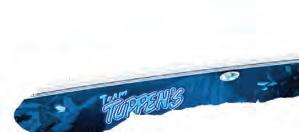

It only took Dean Rocco of Union, NJ about 30 years of visiting the Sebastian Area to land a tarpon. This one took a D.O.A. TerrorEyz jig in the Sebastian River.
cut clams are the baits of choice for pompano and whiting, but a pink Goofy jig can be deadly when the surf is calm. The waters from the beach out a couple of miles can boil with schools of Spanish mackerel and jumbo-sized jack crevalle. When the weather is calm, a boat ride down the beach can really pay off, keep your eyes open and have some stout spinning tackle on board for double digit Jacks, the occasional cobia and an early school of migrating tarpon. Tight lines!











April 1 POOR Morning
April 2 FAIR Morning
April 3 GOOD Morning
April 4 FAIR Morning
April 5 FAIR Morning
April 6 FAIR Evening
April 7 BEST Evening
April 21 POOR Evening
April 22 POOR Evening
April 23 POOR Evening
April 24 BEST Evening
April 25 BEST Evening
April 26 BEST Evening
April 27 POOR Morning
April brings bait to the beach and river and it looks like this month the action will heat up.
Let’s start with my favorite, the snook. April brings rain with rain they’ll open up the locks and that is where my first choice would be. When that water is released, the snook come eating and there are lots of them. Any trip, you will catch a lot of big ones and the right slot limit to take home. Fish the lower side so you catch and release
without harm. I like to use the Ocho from Henn Lures in black and silver and the Yo-Zuri Crystal Minnow. Look for where the eddy breaks and throw in there. Snook will also be at the inlets, with first morning and night being the best.
The tarpon will be rolling off the beach. Look for them at first light right before sunset. Throwing the Ocho on a 1-ounce jig head in black and silver from Henn Lures. Look for these fish to be schooled together and use a heavy tackle, 100-pound leader tied to 65-pound braid and an 8-foot rod. You won’t get them in safe and quick if you don’t.

Trout and redfish can be caught west side of the river near the docks near Midway Road under a shrimp and popping cork. Wade out, high tide being the best, throwing under docks and moving your way out. Make sure you have a dehooker. Catfish will be your bycatch. Until next time, tight lines.

Pushin’ Water Kayak Charters (772) 201-5899
Brian@tckayakfishing.com

www.tckayakfishing.com



INSHORE: Glass minnows should be showing up in good numbers and our small spring mullet run will be right around corner. Artificial baits like D.O.A. C.A.L. shad tails, jerk bait and TerrorEyz will work well around the mangroves, docks and bridges. April also brings tripletail into our river system. Look to target crab trap buoys and channel markers with a D.O.A. shrimp to bring in these tasty fish.
OFFSHORE: April is one of the best months of the year! Tuna and mahi should be a seen on a consistent basis. Trolling live bait should pick up both species as well as other pelagics. Vertical jigging 230-to350 feet will also produce blackfin

tuna and bonito. There are many beach areas to launch your kayak throughout Palm Beach County. Try around Lake Worth pier beach and Boca Inlet for an easy launch. The fishing grounds off our coast are anywhere from 1-to-3 miles. Look to work the 90-to-200-foot depths. Finally, don’t forget about the cobia. Bouncing the reef with a D.O.A. mullet or buck tail jig tipped with a frozen sardine will put you in line for one of these tasty fish.
FRESHWATER: Peacock bass and largemouth will be heading towards their beds to spawn if they have not already. Look to sight fish the bass along the banks. Throwing a small jig in their bed to annoy them will get them to bite. Clown knifefish should be easy to catch using a live shiner or rattletrap. Target deeper water near grass lines. Check us out Pushin’ Water Kayak Charters on Facebook, Instagram and YouTube for all the

latest adventures my clients and I get into.
See you on the water!

Shellen Guide Service





Okeechobee Bass Fishing
Guides/Charters

(863) 357-0892

sjmike7@aol.com




OkeechobeeBassFishing.com
FellsmereResevoirBassFishing.com

Warm days and nights are a lead-up to great fishing on Lake Okeechobee, as stable weather patterns usher in some of the better catching of the year. Speck (crappie) anglers are having a banner year on Okeechobee. It has been quite a few years since so many large specks have been found in the grassy areas that form the littoral zone of the lake.
Kissimmee grass is found surrounding the outside edges of the lake on the north end of the lake and is a prime spot to target and find large speckled perch when they move in shallow water to
spawn. When Kissimmee grass and other native grasses can be found adjacent to one another fishing can go to catching very quickly. Anglers
targeting these fish are using small jigs on very thin line. A large speck can offer quite a challenge when hooked in heavy cover, pulling them through weeds and other cover is challenging due to the very fragile composition of their lips, which can rip or tear easily, freeing a hook and the fish to fight another day. Many times, I have seen the large smile on a fisherman’s face change to a look of horror as a large speck falls back into the water just as it is about to come over the side of the boat.
Bass anglers are finding that catching large numbers of bass to be tougher this year than it has been in quite some time. The artificially high-water levels maintained by the Corps of Engineers allows the bass to access the deepest part of the marsh areas which anglers can
no longer penetrate due to extreme weed growth. The bite can be a hitor-miss affair, one day the fish will be stacked up in an area and eating a spinner bait or chatter bait and the next day the area will seem devoid of fish. The tried-and-true Senko in a black and blue color or a watermelon/red color will always produce fish, it is just a little slower presentation than most people can stand. Working through an area thoroughly before moving on is much more productive to run and gun-style fishing on Okeechobee. Guided shiner trips are producing 25 to 40 fish per morning with big bass in the mix almost daily. Look for the best bass fishing for numbers and big bass around three to four days prior to and after a full or new moon phase.




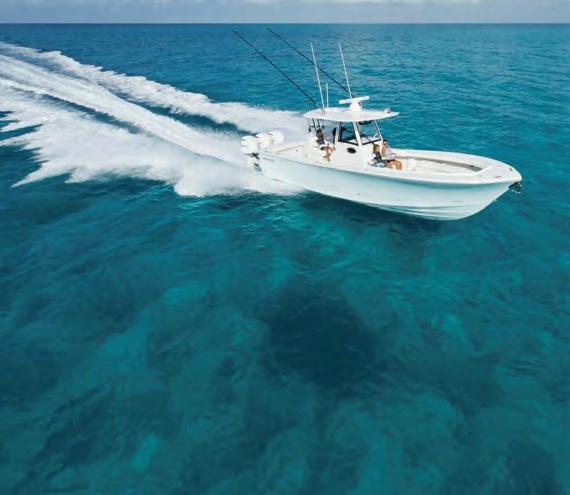





The last couple of months I spent some quiet time fishing our flats with my customers for pompano. It’s really fun to catch these strong fish on fly, either by sight fishing or like in most cases, by blind casting the channels.



For sight fishing in shallow water, I prefer a 9-foot, 7-weight with a floating line and leaders around 10-to-12 foot with a 20-pound fluorocarbon tippet. Blind casting and fishing the channels requires a different set up. In most situations I use a 9-foot, 8-or-9-weight with an intermediate line and a 6-to-8-foot 25-pound fluorocarbon tippet. For deeper channels and or faster current I use the same set up but with a fastsinking line.
The flies I use are typical Clousers in size 1 in color combination white/ orange and white/pink with different
weight lead eyes. Depending on the situation and how deep the water and/ or how strong the current is it is easy to adjust the fly by matching the weight.
Fish your fly deep down at the bottom and strip it short and hard with a second-or-so pause in between the strips. Pompanos are hitting the fly short and you need a good strip set to hook them and you’ll be surprised how strong they are! Pompanos are typical in schools, so if you catch one there is a big chance for many more.
Capt. Michael Mauri www.mauriflyfishing.com michael@mauriflyfishing.com
(772) 485-3321







 By Chris Sharp
By Chris Sharp

In the fishing world, there are a lot of lure making companies you can choose from. You have hard baits, soft baits, flies and so many more. But when you have a company making lures in your own backyard and everyone is welcomed, that is hard to find. Henn Lures, founded in 2020 by Bret Henninger, second generation Florida born waterman, brings that old style, everyone is welcomed, which has been lost in a lot of lure makers.
Custom-made lures that catch fish of any color that you can dream, he makes. Each lure is handpoured, painted and tied in Jensen Beach Florida. Whether it be the Shrinnow or the Ocho, these lures catch fish. But the most important thing about this company is that it is made locally and made by a person who cares about you—you are not just another number. That practice has been lost over the years and when I walked in and walked out, I had made a new friend. I wasn’t just a customer, I was family.
I have fished for over 42 years in Jensen Beach and wish back throughout the years I had a connection with a company that cared about me, like Henn Lures and Brett.


Buy local! Tight lines!

INGREDIENTS
• 4 (6-ounce) Florida grouper fillets
• 1 Florida zucchini, diced small

• 1 Florida squash, diced small
• 1 Florida bell pepper, julienned
• 1 cup Florida orange juice

• 1 tablespoon Florida orange blossom honey

• 1 tablespoon orange marmalade
• 1 tablespoon soy sauce
• 1 tablespoon Dijon mustard
• 1 tablespoon fresh thyme
• 1 tablespoon unsalted butter
• 1 lemon, juiced

• Oil for cooking
• Sea salt and fresh ground pepper, to taste
PREPARATION:
Servings: 4
Calories: 369
In a small pot, over medium-high heat, combine orange juice, honey, marmalade, soy sauce, and mustard. Bring to boil and reduce by half, creating a thick sauce. Remove from heat and set aside.
Preheat a large sauté pan to medium-high heat, add butter and 1 tablespoon oil. Season fillets with salt and pepper, brush each side with orange sauce and sear for 2-3 minutes per side or until cooked through. Remove from heat and set aside.
Wipe out same pan and reheat over medium-high heat with 1 tablespoon oil. Add vegetables and sauté for 5-6 minutes. Stir in fresh thyme and lemon juice. Serve warm with grouper.
Source: followfreshfromflorida.com


Members of the South Atlantic Fishery Management Council approved measures to reduce the annual catch limit for red snapper and help address release mortality for red snapper and other species managed as part of the snapper grouper complex. Snapper Grouper Regulatory Amendment 35 would reduce the total Annual Catch Limit from 42,510 fish to 28,000 fish once implemented. The catch limit reduction is required to address the overfishing status of the stock, primarily due to the continued high number of fish being released by recreational fishermen as the stock continues to rebuild. To help address release mortality, the amendment would limit recreational anglers fishing for snapper grouper species to one hook per line when using natural baits in federal waters in the South Atlantic. If approved by the Secretary of Commerce, the measures are expected to go into place later this year. NOAA Fisheries will make an announcement regarding the 2023
fishing seasons for red snapper prior to any opening in July.


Approval of Regulatory Amendment 35 is part of the Council’s multi-step approach to address management of red snapper and the entire snapper grouper fishery. A Management Strategy Evaluation (MSE) is being developed for the snapper grouper fishery, exploring various management tools in a holistic approach to management. The Council received a presentation on development of the MSE during the meeting. Additional information is now available from the Council’s website https://safmc. net/science-sedar/snapper-groupermanagement-strategy-evaluation/. In addition, the Council is moving forward with Snapper Grouper Amendment 46 to establish a private recreational permit for the South Atlantic snapper grouper fishery. Public scoping meetings were held earlier this year and the Council will continue to receive input from its
advisory panels as the amendment is developed. The Council also approved Snapper Grouper Amendment 53 to end overfishing for gag grouper and establish a rebuilding plan. The Council considered public hearing comments before recommending the amendment for Secretarial approval. The amendment will modify annual catch limits and allocations for gag and create a recreational vessel limit for both gag and black grouper of 2 fish per day or two fish per trip, not
to exceed the daily bag limit of 1 fish (either gag or black grouper) per person per day, whichever is more restrictive. The amendment would also prohibit retention of gag and black grouper by the captain and crew of federally permitted for-hire vessels. Black grouper are included in the measures because of concerns over misidentification between gag and black grouper by the recreational sector. The amendment would also reduce the commercial trip limit for gag to 300 pounds gutted weight.


Come by either location and check it out! Veteran Approved Instruction Facility




Have
smart but not about being prey. They have venomous protection, great camouflage, rapid growth, and breed like rabbits. They can wipe out 90% of all life on a single reef. First seen offshore of SE Florida, where hundreds of exotic tropical fish were released. The lionfish is native to Indo-Pacific and the Red Sea and the infestation has spread throughout the Caribbean, Gulf of Mexico, and way up the Atlantic.
have DEEP SIX DIVE & WATERSPORTS


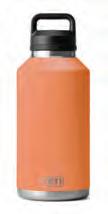







it’s good to VERO BEACH • 772-562-2883 416 21st St., Vero Beach, FL 32960 STUART • 772-692-2747 2525 NW Federal Hwy., Stuart, FL 34994 www.deepsix.com

In 2010 I shot my first lionfish diving in the Tortugas. After stoning him, 6 more of his buddies were trimmed of their 13 dorsal, 2 pelvic and 3 anal venomous spines. I ascended with the last one intact on my sling, which slid down and almost stuck me. Single flopper tips are not good at protecting your hands, even with dive glove. Lionfish are ravenous ambush predators,

Organizations now have lionfish derbies widespread because they have no marine predators. Divers are one of the few effective means of reducing the lionfish population. The largest lionfish I heard was speared in Florida and was 48.8 cm / 19.213 in. My largest lionfish is 17 in.—pictured with me in my Bucs shirt! Lionfish taste like hogfish and is high in lean protein and Omega 3 fats. The Reef Lionfish Cookbook is sure to make your mouth water. The book is full of fantastic recipes!

Moderately short polespears with paralyzer tips work very well to shoot and pin lionfish, and easily slip them into a container. Divers
fish as alternatives!
We don’t just reach anglers. Our readers enjoy all of the outdoors and a variety of recreational activities.
By Ed Killer for CAMThe last two weeks of Lake Okeechobee management has more closely resembled a kid playing with a yo-yo than the workings of a federal agency. Let me try to explain this so we can know what to expect going forward.
Jan. 22 - Army Corps of Engineers










Jacksonville District commander
Col. James Booth announces Lake Okeechobee discharges to begin to “lower the lake” before wet season June 1. Lake is at 16.02 feet above sea level. Corps wants to get it to 12.5 feet by June 1.
Feb. 28 - Army Corps of Engineers closed the flood gates at Port Mayaca Lock and Dam because of the visible presence of fluorescent green cyanobacteria. On Feb. 22, a Florida Dept. of Environmental Protection agency sample tested to have 0.62 parts per billion of microcystin - a toxic substance found in cyanobacteria. At 8 ppb, the EPA says it is harmful to humans, pets and wildlife.
March 2 - Army Corps resumes discharges from Port Mayaca because “no algae is visible” and opens gates at St. Lucie Lock and Dam. About 320 million gallons of dirty lake water streams down the C-44 canal towards Stuart. That water goes into the St. Lucie River for the next four days.

March 6 - Army Corps stops
discharges again because algae is visible to lock and dam workers at Port Mayaca. Discharges also stopped at St. Lucie Lock and Dam.
March 7 - Army Corps resumes discharges at Port Mayaca, but not at St. Lucie Lock and Dam. C-44 too low, they say, and no visible algae present.
In 44 days, lake has come down 7 inches. That’s too much damage downstream to justify that little of a drop in level. Also, discharges west to Calosahatchee River never halted; kept at 1.29 billion gallons a day the whole time.
Seems pretty chaotic doesn’t it?
Here is what I think is going to happen.
1. Toxic algae growth will get worse as sunny days get longer and brighter.
2. Army Corps will have no choice but to stop discharging water to Stuart.
3. Expect total stoppage of discharges by April 15 for year due to algae.
4. Water users along C-44 Canal in western Martin County will complain.
5. Corps will be stuck with too much water in lake heading into unpredictable hurricane season.
Let’s hope Big Ag pulls more water out of the lake for irrigation and helps the coastal estuaries with their water problem. Or else we could all be in for a long summer.
9 8 7 6 5 4 3 2 1
Reach an exclusive demographic: 90% male, 80% home owners, 35% college degree, $82K annual income.
Geo-Target your ad to reach: 10,000+ locally, 190,000+ throughout Florida, or over 400,000 nationally.
A FREE publication means new readers and “fresh eyes” each month that see your ad.
Local editorials from the area’s most experienced fishing guides, charter captains, and writers.
A rate schedule that offers the lowest cost per thousand impressions in the industry.
For the small business a regional or national ad can be a life-changing event.
Your ad will also appear in Coastal Angler Magazine’s E-magazine, marketing your business on the Internet.

We are the largest Free outdoor publication in the US and Bahamas with over 400,000 readers each month.
You are not buying an ad, but investing in your business with Coastal Angler Magazine.

Do
Do you have family or friends who live in Florida?

Did

Increasing water quality in nearshore habitats continues to be of great benefit to improving fish habitats in the Indian River Lagoon (IRL) and St. Lucie County. The IRL continues to be a source of fish recruits for St. Lucie County’s artificial reefs with oyster reefs and muck removal projects being used to increase water quality in the IRL and improve fish habitat.
The ability of oysters to filter the water column of nutrients is well documented. Oysters are filter feeders, consuming microalgae floating in the water column, and incorporating nutrients in the algae into their tissues and waste products. Besides acting as biological filters, oysters can improve water quality by their effect on wave energy. Oysters can grow in intertidal areas. When waves hit exposed oyster reefs, the wave energy decreases and sediments suspended in the water fall out of solution. This settlement means that there are less sediments in the water column, which results in clearer water and greater seagrass growth.
Oyster reefs can also improve water quality by deflecting stormwater effluents. If oyster reefs are placed in front of stormwater outfalls, the reef will deflect stormwater flow. In some instances, flow from a two-foot outfall may originate from a drainage basin of hundreds of acres. Compressing all of the stormwater into a small
diameter outfall can increase the velocity of the stormwater effluents, scouring any seagrasses which may be growing near the outfall.
On March 5, Boy Scout Troop 58 out of Oviedo, led by local SeaGrant Extension Agent Vincent Encomio, deployed two oyster reefs at the Old Fort Park stormwater outfall in the City of Fort Pierce. The deployment was notable in that it was a combination of the Boy Scouts, Florida SeaGrant, the University of Florida, and the St. Lucie County Artificial Reef Program. The modules used were a new plastic-free, prism-shaped design, formulated at the University of Florida, and constructed and filled by the Boy Scouts and Florida SeaGrant. The modules were filled with oyster shells donated by the Indian River Lagoon Aquatic Preserve and are hoped to become the basis for a living shoreline demonstration project at Old Fort Park.
The St. Lucie County Artificial Reef Program has become involved with a project in Moore’s Creek that will also affect water quality in the Indian River Lagoon. Moore’s Creek is an urban tributary running through the heart of the City of Fort Pierce. Its headwaters were cut off by the construction of Interstate 95 and flow of water into the Indian River Lagoon was reduced by a salinity control structure in the 1960s. Clean headwaters have been
replaced by stormwater effluents.

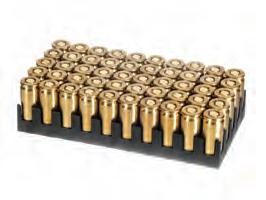

In an effort to aid volunteers with the Marine Cleanup Initiative in removing trash, the City of Fort Pierce has started to lower water levels in the creek. After the second and third drawdown, it was noticed that muck levels in the creek bottom had started to decline. Lowering water levels to oxidize muck sediments in natural water bodies is a common practice but is usually accomplished when levels can be lowered for months, not days. The Florida Fish and Wildlife Conservation Commission and the St. Lucie County Artificial Reef Program are studying this
drawdown technique to see if it might be used in larger tributaries. Irrespective of the mechanism, reductions in muck in the tributaries to the Indian River Lagoon will have a beneficial effect on the lagoon’s water quality, sending more fish to artificial reefs offshore.
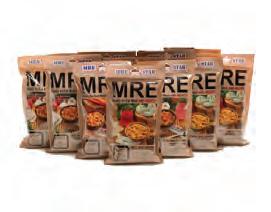



For more information on the St. Lucie County Artificial Reef Program or to get involved with water quality restoration efforts, contact Jim Oppenborn, St. Lucie County Coastal Resources Coordinator, at oppenbornj@stlucieco.org or (772) 462-1713.





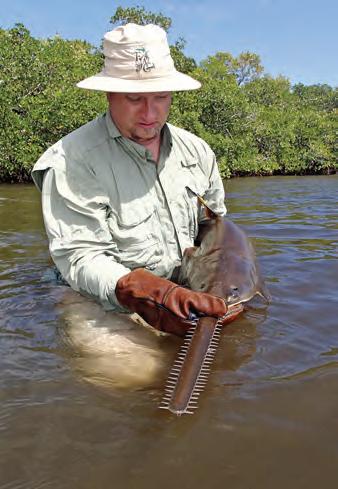 By Tonya Wiley, Havenworth Coastal Conservation
By Tonya Wiley, Havenworth Coastal Conservation
The U.S. Smalltooth Sawfish
Recovery team has released a video titled “RESPECTRELEASE - REPORT: Guidelines for Interactions with Endangered Sawfish in the United States” to provide anglers, divers, and boaters with information about what to do if they catch or see an endangered sawfish.

Sawfish were once found in coastal waters of the United States from Texas to North Carolina. But decades of mortality in fisheries and the loss of important nursery habitats led to
dramatic reductions in both their numbers and range. Now they are generally only found in Florida and most commonly in southwest Florida from Charlotte Harbor through Everglades National Park. Sawfish are federally protected as endangered species under the Endangered Species Act and need your help to survive and avoid extinction. The guidelines in the video will teach you how to Respect, Release, and Report any sawfish you catch while fishing or encounter while diving, snorkeling, or boating.
The video is available on YouTube at https://youtu.be/wxOjcUsxZ4g and at www.SawfishRecovery.org.
If you see or catch a sawfish, note its estimated total length, and the date, time, and your location with GPS coordinates if available. Please share the information by visiting www.SawfishRecovery.org, calling 1-844-4SAWFISH, emailing sawfish@myfwc.com, or entering the details in the FWC Reporter App to help scientists steer research and conservation efforts and track
awfish are culturally important to many native societies around the world. They are considered symbols of strength, spirituality, and admiration. Thinking of predators as valuable icons may seem unusual, but western cultures consider other predators as having positive qualities like the eagle (bravery), the bear (strength), and the lion (nobility) (McDavitt, 2005).
Certain clans among Aboriginal societies in Australia believe that supernatural beings assuming the form of sawfish created the land that their people inhabit. Such beliefs symbolize the tribe’s connection to land and sea. According to the Anindilyakwa people of the Northern Territory of Australia, ancestral beings emerged from burgeoning lands, seas, and skies during the creation of earth. Certain ancestors in animal form, including sawfish, wandered the earth searching for a suitable place to live. The sawfish ancestors used their rostra (“saws”) to gouge rivers and create landscapes. Before the ancestral animals disappeared, they gave the land to humans. The societies that reside in those landscapes view sawfish as respected beings that are models for human values and behavior (McDavitt, 2005).
The Kuna, native to the Caribbean coast, believe that sawfish protect mankind, and will help them fight off dangerous sea creatures, such as sharks or whales, or rescue people from drowning (McDavitt, 2002).
Other societies view sawfish as supernatural beings that bring prosperity and good luck to their communities. Native societies in Panama view sawfish as spiritually powerful beings that were sought out by shamans for ritual purposes. The shamans believed that sawfish harbored powerful spirits and called upon these spirits during religious ceremonies. The shaman would carve batons out of wood to protect the sawfish
the population.
The goal is to recover the United States population of smalltooth sawfish so that it no longer needs the protections of the Endangered Species Act. Following the guidelines in the video will help prevent extinction and aid in population rebuilding and ultimately recovery.
To reach Tonya Wiley, President of Havenworth Coastal Conservation, email Tonya@havenworth.org or call (941) 201-2685.


spirits and believed that this would assure their cooperation in defending the people against supernatural enemies (McDavitt, 2002).
Admired for their predatory behavior, the native people that live along the Sepik River in Papua, New Guinea believe that the sawfish spirits “will punish people who break fishing taboos by unleashing destructive rainstorms,” (McDavitt, 1996). They also believe that sawfish control fish abundance in rivers.
The sawfish has also been a symbol of warfare. Sawfish rostra have been used as weapons in the Philippines, New Guinea, and New Zealand. A picture or drawing of a sawfish was sometimes put on German U-boats, naval ships, and American submarines during World War II (McDavitt, 1996).
In general, sawfish rostra have been used as religious symbols, offerings, and used as a defense against supernatural enemies. People nailed the saws over the doors of houses to keep ghosts out and would also hang them over cradles to keep babies from crying (McDavitt, 1996). Some cultures even used the rostrum of juvenile sawfish as hair combs.
These fascinating and sometimes misunderstood animals have instilled positive attitudes in mankind worldwide. Sawfish populations worldwide are in danger of extinction and the population of smalltooth sawfish in the United States has severely declined over the last century. They have been protected under the United States Endangered Species Act since 2003, but more information is needed to effectively manage the species’ recovery. We encourage anglers and boaters to contact the sawfish researchers by e-mail at sawfish@MyFWC.com or by phone at the sawfish hotline at 844-472-9347 (844-4SAWFISH) to report a sawfish sighting or encounter for research purposes.
Source: MyFWC.com
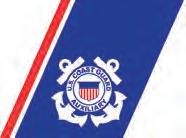

To operate a vessel, the State of Florida requires any person born on or after January 1, 1988 to complete a “Boat America” type course to receive a Florida Safety ID Card.





Suddenly In Command

Boat Hurricane Preparedness



Boat America (BA)
April 20, 2023
April 29, May 1, May 4, May 8, May11, 2023
April 15, 2023; May 20, 2023
Visit http://cgaus59.org for details and payment. For a limited time, BA students ages 10-18 are FREE when accompanied by a paying adult, thanks to AustinBlu Foundation donation.
USCG Auxiliary 59 is located at 3443 S.E. St. Lucie Blvd. (Sandsprit Park), Stuart, FL 34997.




Chris Barber and Gerry Barber had some fishing fun! “My dad and I will be chasing that fishing high/adrenaline rush for a looooong time! We went out of the Fort Pierce inlet with Capt. Richard Hunt with Little Adam’s Fishing Charter and Capt. Jordan Walthan. This Canadian boy can’t wait to come back next year! I asked them for big fish, for that rod bend and scream, boy did they ever deliver with multi species doing just that! It’s hard to pick a favorite because all these fish were a first, but the highlight of the fishing trip was a 30 minute fight with the last runner bait we had for the day (previously hit by a grouper but managed to come back to life) with a 40 pound kingfish, my first ever, which will be a hell of a time trying to beat! Tight lines!










Let’s grow with Florida together.




























Iget the springtime bass itch when the azaleas bloom. It’s the time of year when largemouth bass spawn on Lake Santa Fe.



Bass spawn around the full moons of February and March on this 5,000-acre Alachua County reservoir. is year, I planned my annual Santa Fe trip for March 2-3, ahead of the March 7 full moon.
It was like entering another world that morning as my wife Kim and I motored onto the main lake. Mist rose through the lake’s ancient cypress trees. Wood ducks whistled and banked overhead. Ospreys squealed at us from nests high in the cypress, and loons serenaded us from open water.
Just being there made me feel so fortunate. I thought back to when I was 12 years old on my rst Santa Fe trip with my dad and brother. We stayed at Gri ns Lodge, which was a famous destination for speckled perch, bream and bass shermen in the 1960s and 70s. ey had small cottages for rent and a sh camp run by an old
man named Roy Gri n.
Ol’ Roy taught me to sh Santa Fe. Over the years, he kept telling me to get away from the shoreline and to slow troll. I never really understood why until sonar showed me the grasscovered humps and ledges holding congregations of bait and game sh.
On the lake, Kim and I slowed to trolling speed to get lines out. I sh 7-foot mediumaction rods with Ambassadeur 5500s loaded with 15-pound mono. e rig is simple, just a #2 wide-bend hook tied directly to the line. I hook wild-caught shiners through both lips from the bottom up.
We pull baits very slowly with a three-rod spread. Using level-wind reels, I let baits out 50 or 60 yards behind the boat. I leave the spool in cast mode and tighten the anti-backlash knob to provide enough tension to keep the baits from pulling line. You know you’ve got a bite when the line starts running out.
We only got two lines out before our rst
strike. When the middle rig started paying out line fast, I picked up the rod and pointed it at the sh. A er 20 seconds, I engaged the reel, took up the slack and set the hook hard with a sweeping motion. I reeled fast to keep pressure on the sh and kept the rod tip low to discourage the bass from jumping.
e rst sh was a fat 4-pound female that was full of eggs. Kim landed the second sh, a gorgeous 5-pounder. We caught several more in the 4-pound range before I landed a fat 8-pounder to nish an action-packed three-hour morning with eight total sh. We released them all safely a er admiring the beautiful dark coloration characteristic of Santa Fe bass. I believe this is caused by the clear but tannin-stained water.
We experienced a great nature show, and I told Kim the bass we caught were like a bonus.
Oh, how I love Ol’ Santa Fe!






































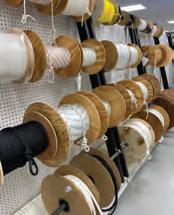
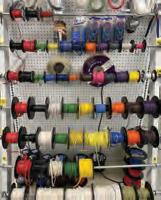







Ashore-based charter shing group intended to catch the largest shark they could from Pensacola Beach, Fla. on Feb. 12. ey did not, however, expect to crank in the estimated 13-foot great white that picked up their bait.
John McLean, of Big John Shark Fishing Adventures, runs shore-based charter trips for clients who want to catch the sh of lifetime. On this particular trip, his clients wanted to “go big, or go home,” so they used a huge yellow n tuna head for bait and enlisted the help of local charter captain, Capt. David Miller, who paddled a small kayak 900 yards o the beach in rough surf to deploy the bait.
Normally, McLean uses a remote-controlled boat to deploy his baits, but these baits were too large for the RC boat to handle. ey had a big sh on before Miller even made it back to shore.
“As soon as his kayak had hit the sand, we were hooked up to a massive shark,” said McLean in a YouTube video documenting the catch.


“I’ve never seen one that fast before,” he says in the video as line rips o the spool of an oversized big game reel.
All four of his clients took turns cranking the reel while everyone else gathered around to help secure the rod rack Mclean drives into the sand and uses to battle giant sharks. Even with heavy gear, the torque of the ght with heavy braided line loosened the reel from the reel seat.
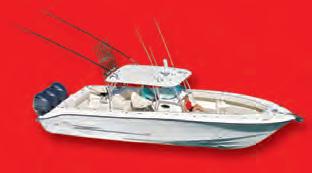
“ is shark was the strongest sh I had ever had on the line. It took all four of my clients switching in and out to land this shark,” McLean said. “ is is the only time I’ve ever seen my shing gear pushed to the absolute limit.”
It took a little more than an hour to bring the giant shark into the surf, and as soon as McLean realized it was a great white, his attention turned to releasing it as quickly as possible. ey used a tail rope to control the giant white shark, and with the leader removed from its mouth, pulled it into deeper water to revive it before it swam away on its own.
White sharks are federally protected. ey must be released immediately when they are caught, so McLean did not take measurements. However, he has extensive experience with big sharks, and he estimated this one at about 13 feet. A 13-foot white shark can easily weigh more than 1,000 pounds.
Great whites are a rare catch in the Gulf of Mexico, and especially from shore. is was not McLean’s rst monster white shark, though. In early March of 2021, also on a shore-based charter in Pensacola Beach, McLean’s clients caught and released an estimated 12-footer.
Check out Big John Shark Fishing Adventures at bigjohnshark shingadventures.com, and see the video at http://bit.ly/3LjTtyw.


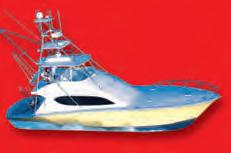
Salina spinning reels feature a hybrid carbonite and Japanese felt DFD drag system that outputs more than 33 lbs of fsh stopping power. Constructed from advanced LITECAST body material that is 15% lighter than die-cast aluminum, these reels are built for both light inshore and heavy ofshore use. With an interchangeable screw-in handle system and six available models from 4000 to 14000, Salina spinning reels are designed to maximize your success on the water.



okumafshingusa.com




Famous for its incredible strength, the Palomar knot ties well in all line types. at’s a huge advantage, and few knots can equal it on that front. Tied properly, this knot won’t slip even on braid, making it a popular choice as an all-around knot for securing line to swivels, hooks and pretty much anything else where a snug connection is desired.

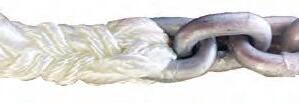
It’s also quite easy and fast to tie, though it can be a tricky choice for lures because it requires a large loop to be passed completely over and around your terminal tackle.





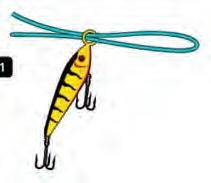

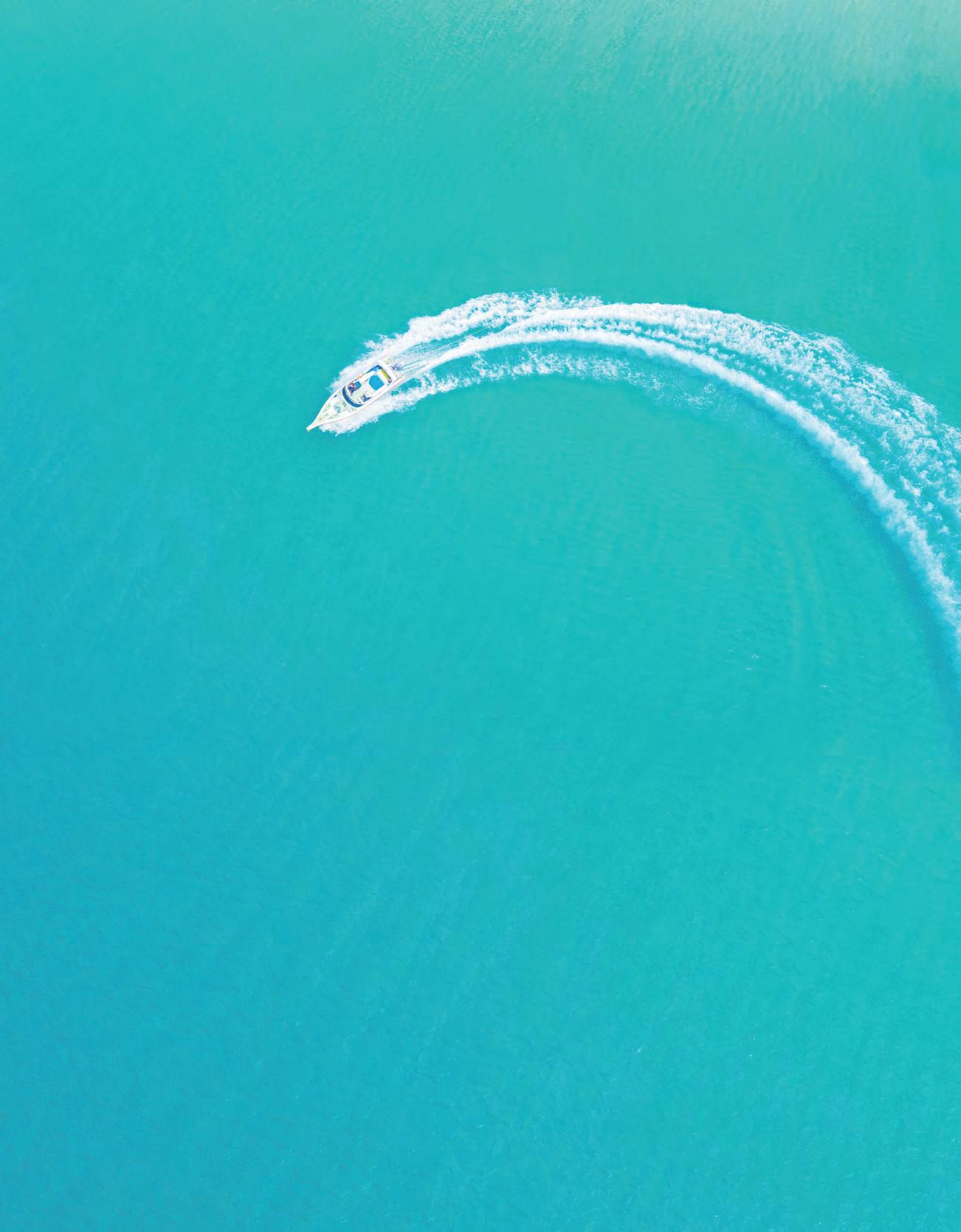
For more tips and tricks, check out https://usangler.com


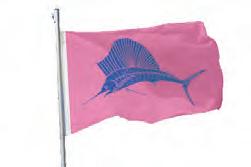






The Perfect Vacation Getaway for Fishing, Boating & Outdoor Enthusiasts




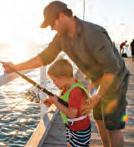


Nestled on six lush tropical acres of pristine waterfront directly on the Indian River Lagoon, take a step back in time to experience the very best of Old Florida charm with modern conveniences and services to make your stay truly memorable and unforgettable.
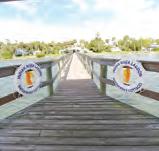


• FULLY FURNISHED 3 ROOM COTTAGES WITH FULLY EQUIPPED KITCHENS


Kingfsh Lodge includes a wide screenTV and bar for small gatherings

Sailfsh House features a wide covered wrap-around porch for larger groups
• Boat Trailer Parking on site w/ Water and Power
• 250 Foot Dock w/ Covered Area
• FREE Ice / FREE Guest Dockage
• Cable TV, Hi-Speed Internet

• 2 miles to the Ft. Pierce Inlet
• 12 miles to the Gulf Stream
• Laundry, BBQ Grilles and FREE use of our Kayaks
349-2206
The wondrous world of summer shing in Alaska draws anglers from around the world who ock to these rich waters annually. Ketchikan, Alaska, nestled in the heart of the sprawling temperate rainforest known as Tongass National Forest boasts the title of “Salmon Capital of the World,” and for good reason.
But salmon are not all visitors can expect to catch in this world-renowned shery. As an experienced captain who runs daily charters out of Ketchikan during the season, I still nd myself surprised by the productivity of these waters. Along with ve species of salmon, we also land big halibut, giant lingcod, paci c cod and rock sh in our daily catch limits. e shing is superb, and so is the wildlife watching. Hit the water with us, and I will gladly hand over the binoculars when marauding pods of orcas show up on the surface or when magni cent humpback whales breach. We share these waters with eagles, sea lions and so much more. It makes a perfect shing getaway for the entire family.
e awe-inspiring beauty that surrounds Ketchikan is something that must be witnessed to understand. From the rugged terrain of old growth forest in Tongass down to the vibrantly rich waters, each day surprises visitors with landscapes and
wildlife that make Ketchikan a bucket-list destination.
Who doesn’t dream of giant halibut or monstrous king salmon on these scenic waters? Peak season runs from midJune through September, with the absolute best shing during the months of July and August. is occurs when we have an overlapping run of king salmon, silver salmon and pink salmon. All the while, big halibut will have moved in from deep water to feed on the abundance of food present. For these reasons, one can expect to catch all species with potential record catches of halibut, salmon, lingcod and rock sh hitting the docks by day’s end.
Here’s what you might expect on a good fullday charter. We start out bottom shing for halibut in 150 to 400 feet of water until we get a limit. Using deep-water jigging rods, you’ll be tasked with reeling in hard- ghting halibut from the depths. en we switch gears to trolling with electric downriggers, running four rods for all ve species of wild Paci c salmon. Whether or not we hit our limit of salmon, we usually end the day jigging with light tackle for giant lingcod and pelagic rock sh to top o the day’s catch. Why settle for one species
when you can sh for them all?
A processing service will llet, vacuum seal and box up your catch to be shipped home overnight or taken on your ight as a checked bag. Ketchikan is easily accessible with convenient commercial ights, just two-hours out of Seattle, and lodging accommodations are available for groups of all sizes.


Book your dream trip to Alaska with Capt. Lukas Brickweg, of Ketchikan’s Finest Fishing Charters, at www.ketchikan shingtrips.com, call (907) 6174717 or email at ketchikan shingtrips@gmail.com.
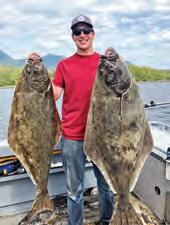



is federally imposed catch limit is the latest point of contention in a two-decade-long power struggle between the Gulf states and the federal bureaucracy over management of one of the region’s most iconic and economically important sheries. Recreational red snapper shing brings millions of tourism dollars to the Gulf Coast each summer. In Alabama, o cials say the quota cut will bring an early end to the season.
e cuts are the result of a complicated formula used by NOAA’s National Marine Fisheries Service (NMFS) to assess red snapper stocks. Federal regulators and environmental groups are pointing to 2022’s reduced red snapper landings as evidence of a depleted shery. In 2020, recreational anglers o Alabama caught 1.1 million pounds of red snapper. In 2022, that gure dropped to less than 500,000 pounds.
AL.com reported that Sean Powers, a leading researcher in the 2020 Great American Red Snapper Count, said the limited landings in 2022 were caused by reduced angler e ort because of high gas prices and poor weather. “ e number of days people went out was half and we caught half of the quota,” Powers told Al.com. “ at’s straight forward. I don’t think it re ects on the health of the stock.”
It’s worth noting that the Great American Red Snapper Count is the study that showed there were more than three times as many red snapper in the Gulf of Mexico than the gures NMFS was previously using to set quotas. For years, sheries managers and politicians from all the Gulf states have been speaking out against NOAA’s “ awed science,” and the Snapper Count seemed to prove their argument. Since the study, NOAA has come up with a new system it says melds the Snapper Count with federal and state surveys. ere is plenty of skepticism over NOAA’s “calibration.”
“Red snapper shing is a huge part of Alabama’s Gulf Coast economy, which is why I’ll continue pushing back against the Department of Commerce’s disastrous proposal to decrease limits for red snapper anglers based on inaccurate data,” said U.S. Sen. Tommy Tuberville (R/Ala.) to Al.com.
Frustration is again mounting over federal management of the red snapper shery in the Gulf of Mexico. is time, the uproar is coming from the Alabama coast, where NOAA (National Oceanic and Atmospheric Administration) slashed the state’s 2023 recreational quota by more than 50 percent.
Alabama’s quota this year is 558,200 pounds, down from 1.1 million pounds in 2022. e Gulf of Mexico Fishery Management Council meets in April, and there is a possibility Alabama’s quota could increase slightly.
See www.al.com to read an excellent article on the issue by John Sharp.

The months of covering water with your favorite topwater are upon us, and what a wonderful time it is! In some parts of the country, bass are already done spawning. While in others, the move to the shallows has only just begun. No matter the circumstances of your sh, they are on the feed and will certainly bite your lure if the right situation presents itself.

Where I live in Florida, the bass have already nished with their spawn. ey are roaming and chasing food to replenish themselves a er a few hard weeks up in the shallows. One of my favorite ways to catch these sh is by covering water with a walk-the-dog style topwater. Not only is it just the coolest bite ever, but it is also a bait that can mimic a ton of di erent food options. is should be used to cover water at a fast pace. Once you locate groups of sh, slow down with something else. row topwater around anything the treble hooks won’t get hung up on, and remember to stay near areas where sh just nished spawning.
In many other parts of the country, bass might currently be up in the shallows spawning. is is another awesome time to throw a walking topwater. Use it to nd sh spawning, and then slow down and pick up a few more sh with a slower bait, if needed. e target options are endless. Grass ats, shallow banks, wood, points, anywhere bass might be spawning is the perfect place to throw a walking bait.
Up North, sh might be in the very early stages of prespawn or even still have ice over their heads. Whatever the case may be, sh will bite a walking bait when the time is right… or when the water is in a liquid form. I have been very successful, especially on smallmouths, throwing a spook-style bait around spawning ats and points for very aggressive sh that are preparing to spawn. Some of the greatest shing memories
The biggest and best fleet of towboats are on your waterways, ready to jump into action when you need help on the water. For peaceful, worry-free boating, be sure to get Unlimited towing from TowBoatU.S.


I have from those parts of the country are from the prespawn. row it over rocks or grass points where bass chase bait as they feed up ahead of the spawn. Walk it over open water or down the bank; they will bite it.

Topwater rod and reel setups can be fairly simple. I like a shorter rod, which makes it easier to walk the dog, with a moderate action, so you don’t rip the hooks out of the sh. e 13 Fishing 7’3” Medium Defy is an a ordable rod with the perfect action. I pair this up with a 7:5:1 Concept A2 spooled with 40-pound Seaguar Smackdown braid for long casts and minimal stretch. e 13 Fishing Power Slide is an awesome topwater for these situations, and I always stick to natural bait sh colors. Grab one of these, get out on your favorite body of water and have some fun!





















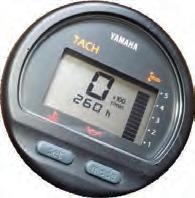



Yamaha’s product line of 22 FT FSH boats has made quite the splash since hitting the water in August of 2022. Building upon the success of Yamaha’s versatile 21-foot center console line that it replaced, there are three separate 22-foot FSH® models that come with Yamaha’s best center console technology and features.
“Speci cally, the new models are 9 inches longer, with gunwales 2 inches higher at the helm and 4 inches higher at the bow than the previous 21-foot line,” said Jon Sutter, Yamaha Boats Product Planning Manager. “And the gunwales are thinner too, which adds to the roominess when passing by the center console.”
is series begins with the value-minded 220 FSH Sport powered by twin 1L TR-1 HO (High Output) engines. Moving up the line is the featurerich 222 FSH Sport, and the premium 222 FSH Sport E being the pinnacle of the series.
O ering sleek lines, agile handling, and superb performance, the new Yamaha 220 and 222 Series center console boats are big, with twin Yamaha marine engines generating up to 360 horsepower. Both 222 FSH models feature added performance delivered by twin 1.8L HO motors. All three models come with a fabric or berglass-molded T-Top with four “rocket launcher” rod holders.
e new 22-foot platform continues Yamaha’s trend toward contemporary design with its deep cockpit and great freeboard, enabling a spacious interior and large bow and cockpit areas.
e center console is nicely nished with plenty of room for Yamaha’s Connext® 5-inch touchscreen that controls the boat’s entertainment and vital system functions, a glass windshield, stainless steel steering wheel, a locking glove box, and a 9-inch Simrad® marine electronics system. And for the rst time on a Yamaha center console boat, all three models get a wirelesscharging phone mount.
ere’s nothing better than hanging out at a favorite cove listening to a great summer playlist. Yamaha has you covered here with its a Hertz® premium sound system that comes standard on the 222 FSH Sport E. is marine sound system comes with a Hertz® head unit, four deck speakers, and two speakers in the color-matched hardtop.
All three 22’ FSH models come standard with mounts for optional swimup seats. At anchor, two removable seats can be attached to the stern. ese seats sit just below the water’s surface, providing comfortable in-water seating facing the transom of the boat. And since the reboarding ladder is located between both seat positions, egress onto the swim platform is a breeze.
Understanding that fishing is the heart and soul of this product line, anglers around the globe have the below features to look forward to when purchasing a Yamaha 22FT FSH series boat:
• Storage for eight rods under the gunwales
• Storage for six rods on the side of the console
• Aerated 26-gal stern livewell
• Simrad® multi-function display
• Jet Wash® washdown system
Ultimately, Yamaha’s 22’ FSH models have set the standard in versatile luxury, while continuing to keep the end consumer in mind with its plethora of convenient amenities. Whether you’re enjoying its premium sound system or relaxing with the award-winning swim up stern seating, your days on the water can only be enhanced with Yamaha.
Learn more at YamahaBoats.com
222 FSH Sport EEat, sleep, sh, repeat. Although I would love to live this life, it is just not possible… yet. I recently saw a cartoon that listed things I like to do in my spare time. Go shing, buy shing tackle, research shing and talk about shing. is rang true to me since this sport consumes my thoughts as it does many of yours. Here are a few things that I do when I am not shing that help me when I do have the opportunity to go. With the high winds of spring upon us, we all might have a little more dock time than water time.
I’m fascinated with weather. Not only do I look at the current conditions and forecast where I am, but I also look at it in areas where I travel to sh. is does a couple of things for me. First, it allows me to see possible great weather opportunities when I might be able to plan ahead and sneak away. It also keeps me from going on a day when the weather might be great, but the previous several days featured winds blowing strong from an unfavorable direction. For example, here on the Texas coast, southwest is a detrimental direction for high winds. It muddies most bays on our coast. e previous days’ wind velocity and direction are good to know and determine where I head when I launch the boat.
I spend a lot of time on the road, and I like listening to shing podcasts. Some of these give general information, and some are weekly reports covering current conditions and activity. ese can be great to stay in tune with what is happening and to learn from new points of view on approaching certain situations. ey might also cover new products I want to try.

Di erent social media platforms also keep you in tune. Find reputable anglers or guides in your area or an area you plan to go. Some frequently post how-to or what’s been working for them. ey might also talk about how to approach a certain area. If you like to travel to new areas, which I do, knowing how to approach an area can be key. In my local waters, we might approach a spot one way, but if I go to another state they may do the opposite. Knowing the local game plan can save the day.
By Capt. Michael Okruhlik
Last but not least, I look at satellite imagery very o en. One tip is to change the view and the year the image was taken for areas you sh. ese images can be dramatically di erent than the current images, and they might o er a much-improved view of bottom structure to point you to a spot you’ll want to try next time you are on the water.


e weather is warm, don’t forget to take a kid shing!


 Capt. Michael Okruhlik is the inventor of Knockin Tail Lures®, and the owner of www.MyCoastOutdoors.com.
Capt. Michael Okruhlik is the inventor of Knockin Tail Lures®, and the owner of www.MyCoastOutdoors.com.


In the 17th century, the walking stick overtook the sword as an essential part of a gentleman’s wardrobe. Though it was primarily used as a decorative accessory, it could also function as a weapon if necessary. For men of the era, these walking sticks were a statement piece, and a way to communicate their wealth and refinement.
Today, walking sticks still represent status and prosperity –– a way to show off your deep pockets without being too flashy. In that vein, we present the Santa Fe Walking Stick. Made of eucalyptus wood painted a glossy black with an antiqued silverfinished sculpted handle, what gives this piece of finery a distinctive edge is an 18-carat turquoise inlay that’s been enhanced to bring out its best blues. Don’t be bashful about your affluence. See why the Santa Fe Walking Stick is the embodiment of sophisticated elegance for the modern gentleman.
Don’t delay: Our must-have Santa Fe Walking Stick was one of our best-selling items this past year. Because of this, we can only offer 723 walking sticks at this price with this ad! See why Stauer is becoming one of America’s fastest-growing sellers of walking sticks today!
“I recommend it without reservation and commend Stauer for offering quality at a fair price.” — Steven, Arlington, VA
“Dignified, well crafted and an extremely comfortable fit in your hand. Just MAGNIFICENT! Makes me feel years younger!”
— Chas, Placida, FL
Speci cations:











• 18 carats of enhanced turquoise. Antiqued silver-finished and sculpted brass handle. Eucalyptus wood. Rubber tip





• Supports up to 250 pounds
Santa Fe Walking Stick
36" Santa Fe Walking Stick $159 $79* + S&P Save $80
40" Santa Fe Walking Stick $179 $89* + S&P Save $90

*Special price only for customers using the offer code.
1-800-333-2045
Your Insider Offer Code: FWS135-01




















